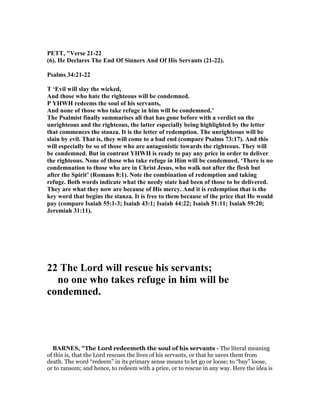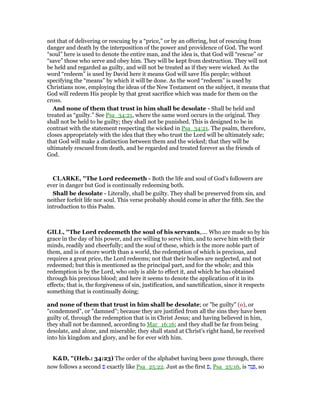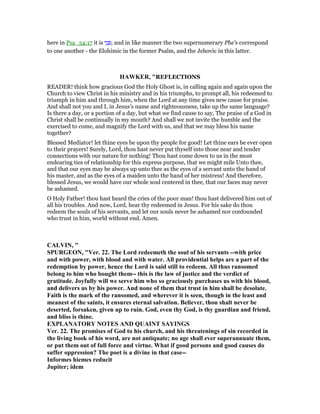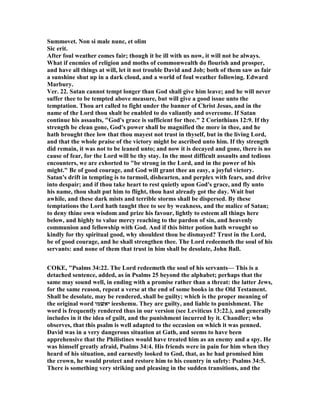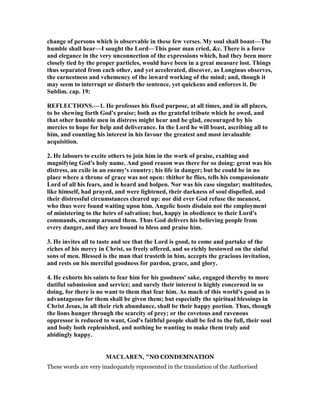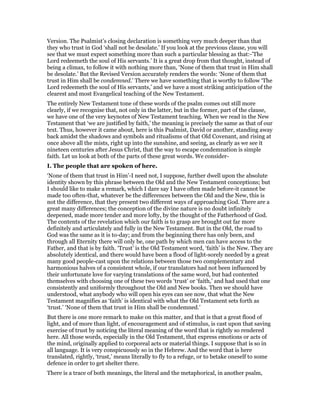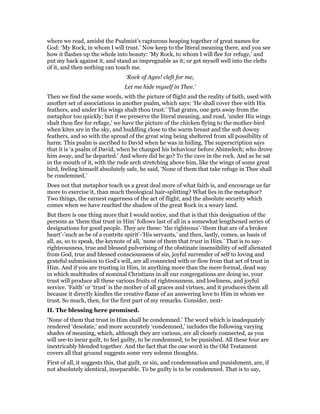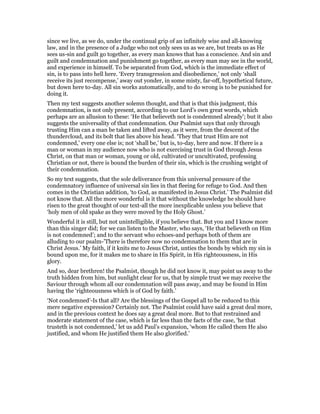Psalm 34, attributed to David, reflects on his experience of escaping from King Abimelech by feigning madness, emphasizing the importance of constant praise to God in all circumstances. The psalm consists of a hymn and an exhortation, encouraging others to share in acknowledging God's goodness and providential care. It serves as a reminder of the mercy experienced despite personal shortcomings, urging a life dedicated to thanksgiving and public worship.
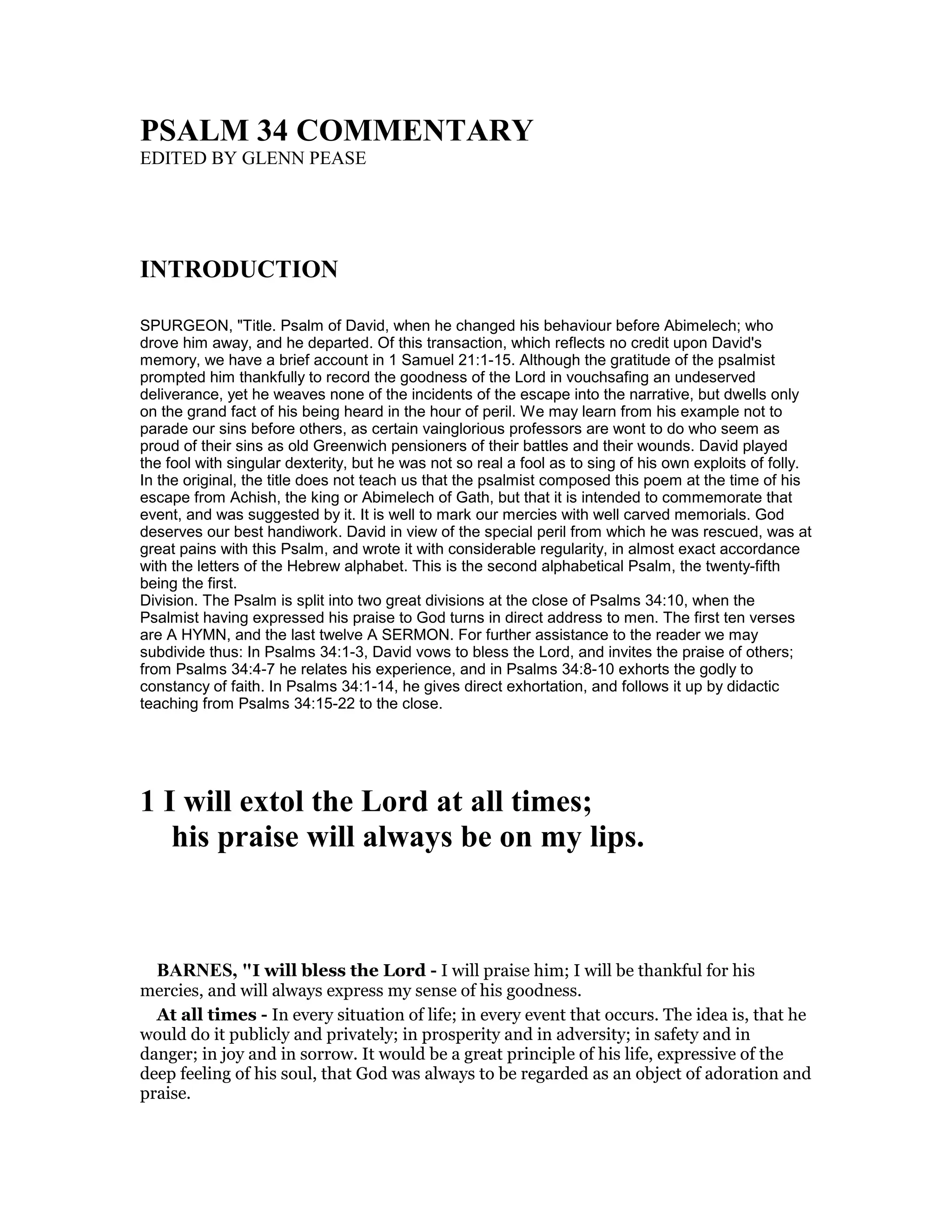
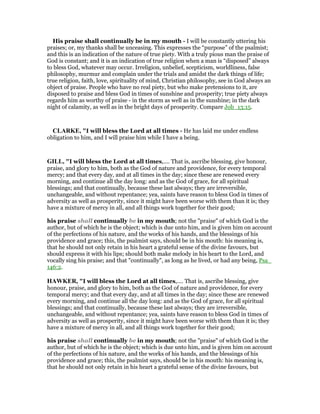
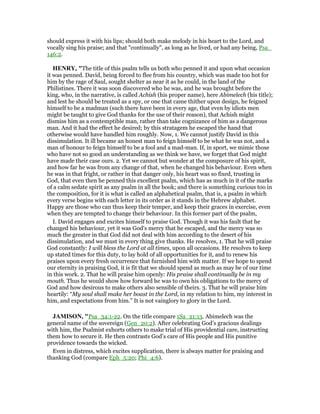
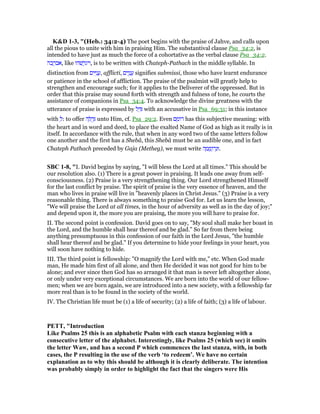
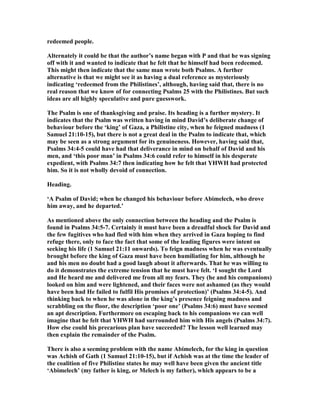
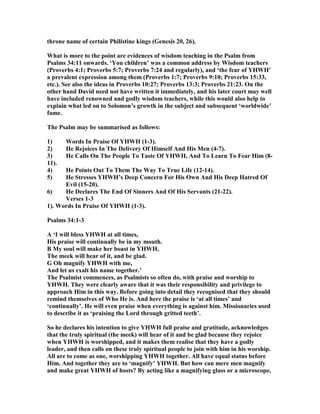
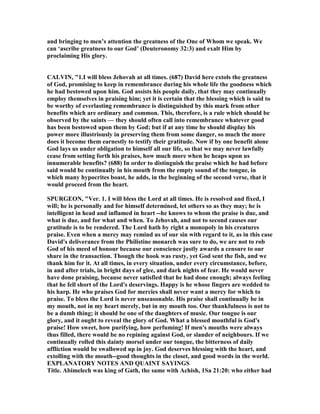
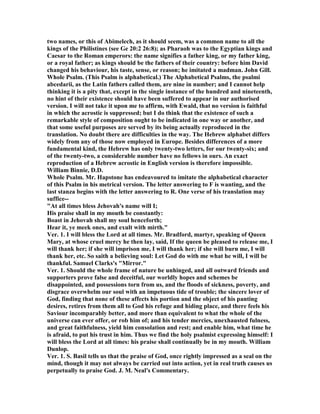
![COKE, "David praiseth God, and exhorteth others thereto by his experience. They
are blessed that trust in God. He exhorteth to the fear of God. The privileges of the
righteous.
A Psalm of David, when he changed his behaviour before Abimelech; who drove
him away, and he departed.
Title. ויגרשׁהו vaigarshehu. Who drove him away— Who dismissed him, according to
the Vulgate, LXX, Arabic, &c. It is very probable, that Abimelech was a name of
dignity given to all the kings of Gath, as Pharaoh and Caesar were to the Egyptian
and Roman kings. See the notes on 1 Samuel 21. Dr. Delaney is of opinion, that
David wrote this psalm for the use and instruction of those men who resorted to him
at Adullam, after his departure from Gath. The psalm (says he) contains the noblest
encouragements to piety and virtue, from an assurance that all such as are so
devoted are the immediate care of Almighty God; as all those of a contrary
character are his abhorrence, and the sure marks of his vengeance. The psalm,
considered in this light, is certainly one of the noblest, the best turned, best judged,
and best adapted compositions, that ever was penned. David begins by encouraging
them to piety and gratitude to God from his own example, Psalms 34:1-7. He then
exhorts others to make trial of the same mercies; to learn the goodness of God from
their own experience, Psalms 34:8-9. He then assures them, that strength and
magnanimity are no securities from want and distress; whereas trust and confidence
in God are a never-failing source of every thing that is good, Psalms 34:10. After
which he sums up all in a most pathetic and beautiful exhortation to piety and
virtue, and to confidence in God; in full assurance, that, as he was the guardian and
true protector of virtue in distress, so was he the unerring observer and steady
avenger of wickedness. See Life of David, b. i. c. 12.
TRAPP, "Psalms 34:1 « [A Psalm] of David, when he changed his behaviour before
Abimelech; who drove him away, and he departed. » I will bless the LORD at all
times: his praise [shall] continually [be] in my mouth.
Ver. 1. A Psalm of David] An alphabetical psalm, which David (newly delivered
from the Philistines, who had taken him prisoner, and presented him to their king as
a special prize) composed with singular art; as fit to be committed to memory by all
godly people, who may here meet with many excellent lessons and cordial comforts.
Semper in ecclesia hic psalmus piis fuit commendatissimus (Moller).
When he changed his behaviour] Heb. Gustum, hoc est gestum. This he did (being
put to his shifts), but not without sin, for he was splendide mendax (as Horace, lib.
iii. Od. 11, saith of Hypermnestra), at the best; neither can this dissimulation or
officious lie of his be excused; as some have by distinctions endeavoured it, but in
vain.](https://image.slidesharecdn.com/psalm34commentary-160516140540/85/Psalm-34-commentary-9-320.jpg)
![Before Abimelech] Or, Achish, king of Gath, 1 Samuel 21:10, for he was binominis,
saith Aben Ezra; or else Abimelech, that is, father king, was his title of honour; as
Augustus would be styled Pater Patriae, the father of his country. R. Solomon saith
that Abimelech was a common name to all the Philistine kings, as Pharaoh to the
Egyptian.
Who cast him out] For a mad man, 1 Samuel 21:15, wherein there was a sweet
providence of God, who can order our disorders to his own glory and our good; like
as a craftsman with a crooked tool can make straight work; or as an apothecary of a
poisonous viper can make a wholesome treacle.
And he departed] Into some parts of Judea, where he might repent of his sin first (as
Peter did when got into a corner), and then compile this psalm of thanksgiving to
God, who had so graciously delivered him out of that hard and hazardous condition,
not only above, but against his desert.
Ver. 1. I will bless the Lord at all times] As not satisfied with anything I can do
herein at any time. The saints have large hearts, and could beteem the Lord a great
deal more service than they are able to perform. A certain martyr said at the stake, I
am sorry that I am going to a place where I shall be ever receiving wages and do no
more work.
His praise shall continually be in my mouth] For this remarkable mercy especially,
which I will still be telling of, and speaking good of God’s name to as many as I can
possibly extend unto. This thankful man was worth his weight in the gold of Ophir.
COFFMA , "THA KSGIVI G TO GOD FOR DELIVERA CE
The ancient superscription ascribes this psalm to David and identifies it with the
occasion when he feigned madness to escape from Abimelech. It is an imperfect
acrostic, omitting the sixth letter and adding another letter at the last, very similar
in this particular to Psalms 25.
We are surprised that five or six reputable scholars point out what they call a
mistake in the superscription, insisting that in 1 Samuel 21:11-15, the name of the
king from whom David escaped by feigning madness was called Achish, not
Abimelech.
Of course, these ancient superscriptions have no claim to having been written by
inspiration; and it is altogether possible that there are indeed mistakes in some of
them; but in the instance before us, there is a much better explanation of the two
names than merely branding one of them as "a mistake."](https://image.slidesharecdn.com/psalm34commentary-160516140540/85/Psalm-34-commentary-10-320.jpg)
!["Abimelech was the title of Philistine kings, just as Pharaoh was the title of
Egyptian kings."[1] o less than a dozen Roman emperors bore the title of Caesar.
Could we ascribe an error to Luke because he reported that Paul said, "I appeal
unto Caesar" (Acts 25:11), whereas, in fact, he really appealed unto " ero?"
Allegations of "error" in this inscription are therefore an indication of the
ignorance of commentators rather than any kind of a reflection against what is in
the superscription. It also should be noted that the dynastic name Abimelech was
known when Moses wrote Genesis 20, and Genesis 26, centuries before the times of
David.
The fact of the psalm's being an acrostic is considered sufficient grounds by
destructive critics for assigning a date to this psalm long after the times of David
and declaring that, "The date of it is post-exilic."[2] Such a statement is an
unsupported error, an illegitimate child of the critic's imaginary dictum that the
acrostic form of writing psalms was unknown to David, and developed long
afterward. This is not true. As Delitzsch said, "The fact of the Psalm's being
alphabetical (acrostic) says nothing against David as the author of it."[3] Alexander
Maclaren also stated that, "Acrostic structure's indicating a late date is by no means
self-evident,"[4] adding that it has certainly not been proved.
Some have expressed amazement that David here gave no details of the manner in
which God had delivered him out of the hands of Abimelech (Achish), by feigning
madness, a ruse which nearly all the older writers vigorously condemned, as
hypocritical.
Spurgeon commented on David's omission of any reference to his pretended insanity
as follows:
David dwells only on the grand fact of God's having heard his prayer and delivered
him. We may learn from his example not to parade our sins before others, as certain
vainglorious professors are doing, and who seem to be as proud of their sins as old
soldiers are of their battles and wounds.[5]
This reminds us of certain "witnessing for Christ" that goes on at the present time
in some churches, in which members more eloquently confess their sins than they
confess the Christ.
Barnes identified the following four paragraphs in the psalm: (1) thanksgiving for
deliverance (Psalms 34:1-6); (2) from his experience, he invites others to join in
praise (Psalms 34:7-10); (3) special instructions and exhortations for the young to
trust in God (Psalms 34:11-14); (4) a general summary of the security, joys, and
protection for those who truly rely upon God (Psalms 34:15-22).[6]
Psalms 34:1-6](https://image.slidesharecdn.com/psalm34commentary-160516140540/85/Psalm-34-commentary-11-320.jpg)
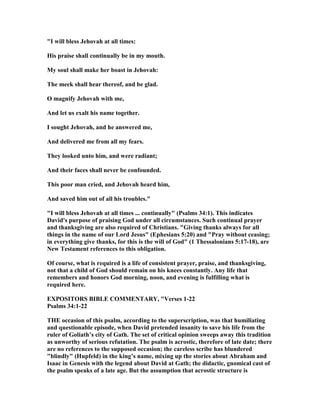
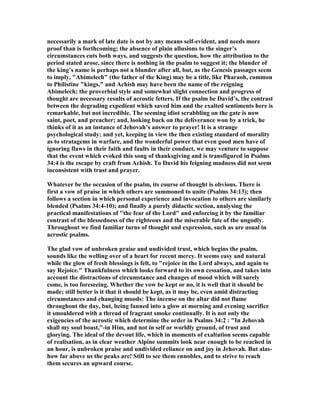
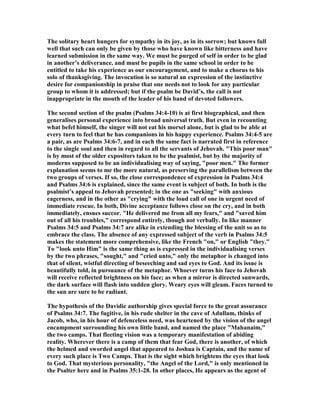
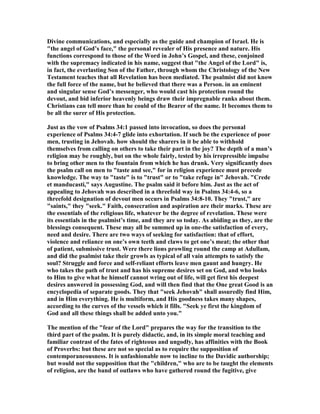
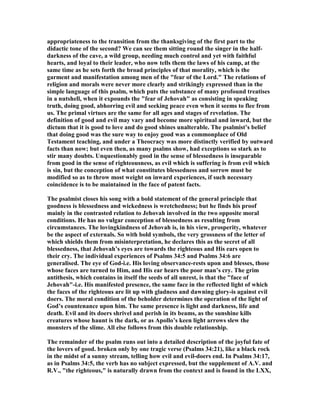
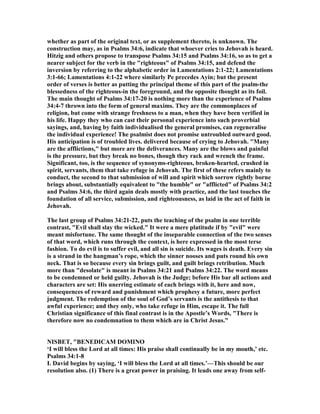
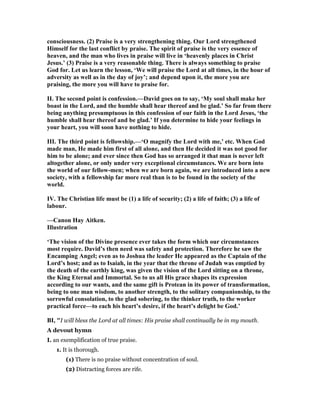
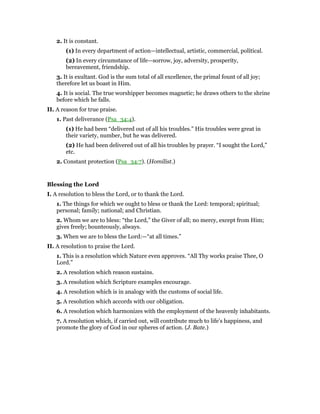
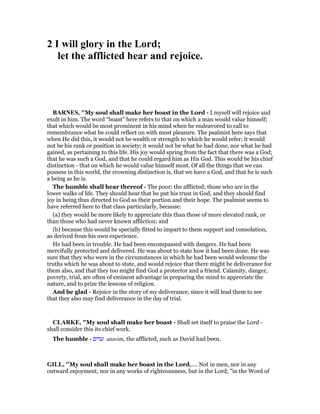
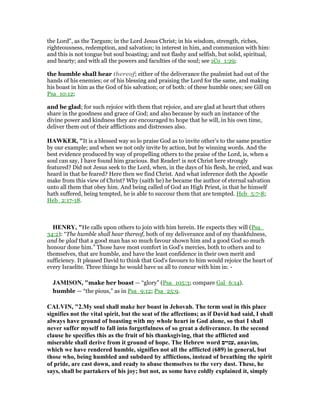
![from a feeling of sympathy, but because, being persuaded that in the example of
David, God had given them a general testimony of his grace, their hearts would
recover from sorrow, and would be lifted up on high. Accordingly, he says that this
joy shall spring from hope, because, having received a pledge of their deliverance,
they shall cheerfully have recourse to God.
SPURGEO , "Ver. 2. My soul shall make her boast in the Lord. Boasting is a very
natural propensity, and if it were used as in this case, the more it were indulged the
better. The exultation of this verse is no mere tongue bragging, "the soul" is in it,
the boasting is meant and felt before it is expressed. What scope there is for holy
boasting in Jehovah! His person, attributes, covenant, promises, works, and a
thousand things besides, are all incomparable, unparalleled, matchless; we may cry
them up as we please, but we shall never be convicted of vain and empty speech in
so doing. Truly he who writes these words of comment has nothing of his own to
boast of, but much to lament over, and yet none shall stop him of his boast in God so
long as he lives. The humble shall hear thereof, and be glad. They are usually
grieved to hear boastings; they turn aside from vauntings and lofty speeches, but
boasting in the Lord is quite another matter; by this the most lowly are consoled
and encouraged. The confident expressions of tried believers are a rich solace to
their brethren of less experience. We ought to talk of the Lord's goodness on
purpose that others may be confirmed in their trust in a faithful God.
EXPLA ATORY OTES A D QUAI T SAYI GS
Ver. 2. My soul shall make her boast in the Lord. ot like the boasting of the
Pharisee, so hateful in the eyes of God, so offensive in the ears of the humble; for the
humble can hear this boasting and be glad, which they would never do if it were not
conformable to the rules of humility. Can any boasting be greater than to say, "I
can do all things"? Yet in this boasting there is humility when I add, "In him that
strengtheneth me." For though God likes not of boasting, yet he likes of this
boasting, which arrogates nothing to ourselves, but ascribes all to him. Sir Richard
Baker.
Ver. 2-6. There is somewhat very striking and pleasing in the sudden transitions,
and the change of persons, that is observable in these few verses. "My soul shall
boast; ""The humble shall hear; " "I sought the Lord; ""They looked to him;
""This poor man cried." There is a force and elegance in the very unconnectedness
of the expressions, which, had they been more closely tied by the proper particles,
would have been in a great measure lost. Things thus separated from each other,
and yet accelerated, discover, as Longinus observes, the earnestness and the
vehemency of the inward working of the mind; and though it may seem to interrupt,
or disturb the sentence, yet quickens and enforces it. Samuel Chandler, D.D.
TRAPP, "Psalms 34:2 My soul shall make her boast in the LORD: the humble shall
hear [thereof], and be glad.
Ver. 2. My soul shall make her boast in the Lord] This holy gloriation is a
Christian’s duty not to be neglected. The Church in the Canticles is much in it; and
so is St Paul. It showeth a heart full of joys unspeakable and full of glory, 1 Peter](https://image.slidesharecdn.com/psalm34commentary-160516140540/85/Psalm-34-commentary-22-320.jpg)
![1:8. And, besides, God is thereby greatly glorified, Jeremiah 9:23-24.
The humble shall hear thereof, and be glad] ot for my sake only, but their own, as
conceiving good hope of like deliverance. But, then, they must be as I am, not only
humbled, but humble; low, but lowly.
COFFMA , ""My soul ... shall boast in Jehovah" (Psalms 34:2). Our boasting
should never be "in self or worldly goods."[7] ot in fame, fortune, success, beauty,
strength, youth, family, honors, reputation, or anything else, should the child of God
receive in his heart as that which is most prized and appreciated; but the fact that
one is privileged to be called God's child "in Christ," that is the greatest thing.
SIMEO , "DEVOTIO EXEMPLIFIED
Psalms 34:2-3. My soul shall make her boast in the Lord: the humble shall hear
thereof, and be glad. O magnify the Lord with me, and let us exalt his name
together.
A SE SE of gratitude to God for his mercies will ever abide in some measure on the
soul of a true believer. But there are special occasions whereon he is so impressed
with the Divine goodness, that he feels as if he never could forget it, and as if he
would have the whole creation join with him in his devout acknowledgments. This
was the frame of David’s mind, when, by feigning himself mad, he had escaped out
of the hands of Achish, who would probably have put him to death, or delivered him
into the hands of Saul, his blood-thirsty persecutor [ ote: Compare 1 Samuel 21:10
to 1 Samuel 22:1. with the title of this psalm.].
In discoursing on his words, we shall notice,
I. His determination to praise God—
Ungodly men love to boast of themselves—
[There is no man who has not some imaginary excellencies whereof to boast. If we
possess any natural endowment either of mind or body, we are forward to bring it
into notice, and to arrogate something to ourselves on account of it. One values
herself upon her beauty; another boasts of his strength or courage; another prides
himself in his wit, his penetration, or his judgment. Rather than pass unnoticed, the
ungodly will boast of their iniquities and excesses; yea, (strange to say!) of iniquities
they have not committed, and of excesses to which they have never arrived.]
The godly, on the other hand, “make their boast in the Lord”—
[They know, by bitter experience, that in themselves dwelleth no good thing, yea,
nothing but what furnishes matter for the deepest humiliation. But they see in God](https://image.slidesharecdn.com/psalm34commentary-160516140540/85/Psalm-34-commentary-23-320.jpg)
![sufficient to excite their devoutest adoration. Whether they contemplate the
perfections of his nature, or the works of his hands, the wonders of his providence,
or the riches of his grace, they are filled with wonder and astonishment; and,
pouring contempt on all created excellencies, they exclaim, “O God! who is like unto
thee [ ote: Deuteronomy 32:31. Exodus 15:11. Micah 7:18.]?” “Thanks be to God,
who always causeth us to triumph in Christ [ ote: 2 Corinthians 2:14.]!”]
The Psalmist was the more induced to praise God in a public manner, from a
consideration of
II. The effect he hoped to produce by this means—
He did not expect any particular benefit to accrue to the proud—
[The proud, alas! are disgusted with even the mention of God’s name, provided it be
with reverence and love: nor do they ever speak of him themselves, unless it be to
profane his name in oaths and curses. Their aversion to hear of him increases
according to the degree in which he is honoured. They will suffer us to speak
somewhat of God as he is manifested in creation; but they do not like to be told of
his love in redemption. They will bear to hear a little of God (though but little) in his
works of providence; but they cannot endure to hear one syllable of his gloriously
rich and sovereign grace. If we utter but a word expressive of admiration and love
on account of his condescension in revealing himself to our souls, we forfeit at once
all title to respectability, and become in their eyes the most contemptible of beings.
They would be less offended with oaths and blasphemies and the grossest obscenity,
than with one such an expression of love to God.]
But he hoped that to the humble his adorations would afford matter of unfeigned
joy—
[The godly are not so free from pride, but that flattery sometimes finds access to
their hearts, and proves a gratification to their unwary minds. But in their better
seasons, when their airy dreams have vanished, and they obtain juster views of
themselves, they most unfeignedly lothe and abhor themselves, and desire that God
alone should be exalted. To be told of their own goodness is nauseous and
unpalatable: but to hear the praises of their God and Saviour, this is delightful to
their souls. It is this that endears to them the ministers of God: he who with the
clearest evidence and richest unction exhibits to their view the glory and excellency
of their God, will be regarded as their best friend: and every one who in sincerity
labours to fulfil this office, will be “esteemed by them very highly in love for his
work’s sake.”]
To stir up within ourselves a similar disposition, let us consider,
III. His exhortation to co-operate with him in this blessed design—
He calls on all of us to unite with him in praising and adoring God: and his](https://image.slidesharecdn.com/psalm34commentary-160516140540/85/Psalm-34-commentary-24-320.jpg)
![exhortation may well serve as an
Application to the foregoing subject. We ask then,
1. Is it not a reasonable employment?
[Let any one call to mind the excellencies of God as they are described in Scripture,
and then say whether it is not reasonable that we should exalt his name. But more
particularly, let the wonders of redemption be surveyed (O wonders inexpressible,
and surpassing all comprehension!); let the thought of God’s co-equal, co-eternal
Son, becoming man, of his dying upon the cross, of his living again to make
intercession for us in heaven; let the thought of this being done to deliver our souls
from death, and to restore us to the favour of our offended Father; let this, I say,
dwell upon the mind, and we shall see at once the reasonableness of this duty, and
the utter unreasonableness of passing one day or one hour without renewed
expressions of gratitude and thanksgiving.]
2. Is it not a delightful employment?
[Poor indeed is the mirth of this world, when compared with the joy of praising
God. This is the work of all the glorified saints and angels: “they rest not day or
night, saving, Holy, holy, holy, is the Lord God of Hosts!”
And if this be the employment of heaven, what must such an exercise be to us, but a
heaven upon earth? It is indeed a foretaste of heaven, as all who have ever engaged
in it are constrained to acknowledge: nor, if we were always thus engaged, would
any trouble or sorrow be able to molest us: our very afflictions would rather give
energy to our souls, and enlarge at once our subjects of praise, and our disposition
to abound in it.]
3. Is it not a necessary employment?
[It is grievous on such a subject as this to insinuate any thing of an alarming nature:
but, if men will not be “constrained by love,” we must endeavour to “persuade them
by the terrors of the Lord.”
God declared to his people of old, that, if they would not serve him with joyfulness
and gladness of heart for the abundance of all things which he had so liberally
bestowed upon them, they should endure all the curses denounced in his law [ ote:
Deuteronomy 28:45; Deuteronomy 28:47.]. With how much greater force does this
threatening come to us, if we neglect to praise him for the infinitely greater benefits
he has conferred on us! We ourselves feel indignant if great and acknowledged
virtues be despised, or eminent favours be disregarded. And shall God ever look
with complacency on those who are blind to his excellencies, and insensible of his
mercies? Whatever we may imagine to the contrary, none shall ever join the choir
above, whose hearts have not been tuned to sing God’s praise below.]](https://image.slidesharecdn.com/psalm34commentary-160516140540/85/Psalm-34-commentary-25-320.jpg)
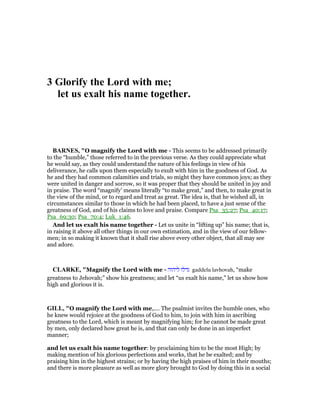
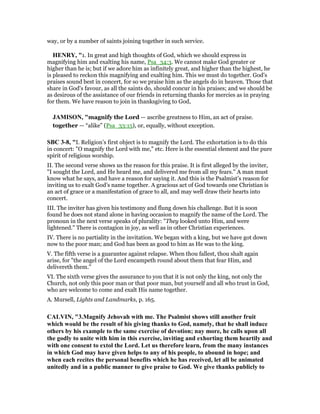
![God, not only that men may be witnesses of our gratitude, but also that they may
follow our example.
SPURGEO , "Ver. 3. O magnify the Lord with me. Is this request addressed to the
humble? If so it is most fitting. Who can make God great but those who feel
themselves to be little? He bids them help him to make the Lord's fame greater
among the sons of men. Jehovah is infinite, and therefore cannot really be made
greater, but his name grows in manifested glory as he is made known to his
creatures, and thus he is said to be magnified. It is well when the soul feels its own
inability adequately to glorify the Lord, and therefore stirs up others to the gracious
work; this is good both for the man himself and for his companions. o praise can
excel that which lays us prostrate under a sense of our own nothingness, while
divine grace like some topless Alp rises before our eyes and sinks us lower and lower
in holy awe. Let us exalt his name together. Social, congregated worship is the
outgrowth of one of the natural instincts of the new life. In heaven it is enjoyed to
the full, and earth is like heaven where it abounds.
EXPLA ATORY OTES A D QUAI T SAYI GS
Ver. 2-6. There is somewhat very striking and pleasing in the sudden transitions,
and the change of persons, that is observable in these few verses. "My soul shall
boast; ""The humble shall hear; " "I sought the Lord; ""They looked to him;
""This poor man cried." There is a force and elegance in the very unconnectedness
of the expressions, which, had they been more closely tied by the proper particles,
would have been in a great measure lost. Things thus separated from each other,
and yet accelerated, discover, as Longinus observes, the earnestness and the
vehemency of the inward working of the mind; and though it may seem to interrupt,
or disturb the sentence, yet quickens and enforces it. Samuel Chandler, D.D.
Ver. 3. Venema remarks that after the affair with Achish, we are told in 1 Samuel
22:1, "His brethren, and all his father's house went down to the cave Adullam unto
him, "and these, together with those who were in debt, and discontented with Saul's
government, formed a band of four hundred men. To these his friends and
comrades, he relates the story of his escape, and bids them with united hearts and
voices extol the Lord. C. H. S.
COKE, "Psalms 34:3. Magnify the Lord with me— These, and the like expressions,
do not mean that we can add any thing to the glory of the name or nature of God;
but that we should shew forth and publicly celebrate his majesty and greatness,
when we experience the interpositions of his providence in our deliverance from any
threatening evil. We should then, with the Psalmist, glory in God; i.e. ascribe our
safety, not to our own contrivance, subtilty, or power, but to the assistance and care
of God, who watches over us. Chandler.
TRAPP, "Psalms 34:3 O magnify the LORD with me, and let us exalt his name
together.
Ver. 3. O magnify the Lord with me] As not sufficient to do so great a work himself,
he calleth in the help of others. We read of a monster rather than a man, who lying](https://image.slidesharecdn.com/psalm34commentary-160516140540/85/Psalm-34-commentary-28-320.jpg)
![on his death bed, not only himself swore as fast and as furiously as he could, but
desperately desired the bystanders to help him with oaths, and to swear for him. I
knew the man, saith mine author (Bolton, Assize Serm.). And should not we much
more call upon others to join their forces with ours in magnifying the Lord? Birds,
when they come to a full heap of corn, will chirp and call in for their fellows.
Charity is no churl; goodness is diffusive.
And let us exalt his name together] And so begin heaven beforehand. Aben Ezra
glosseth thus, Quasi diceret, os omnes simul ad laudandum Deum sumus
imbecilles, We are all too weak for this work, though we should all do our utmost at
it.
COFFMA , ""O Magnify Jehovah with me" (Psalms 34:3). "We cannot add to
God's glory; he is infinite, eternal, and changeless. othing that feeble men can do is
capable of either increasing or diminishing the glory of God. However, his name
may be said to grow in glory as it is made known; and his character will stand
higher in the sight of men as he becomes more and more the supreme object of trust
and love."[8]
4 I sought the Lord, and he answered me;
he delivered me from all my fears.
BAR ES, "I sought the Lord, and he heard me - That is, on the occasion
referred to in the psalm, when he was exposed to the persecutions of Saul, and when he
sought refuge in the country of Abimelech or Achish: 1Sa_21:1-15. The idea is, that at
that time he did not confide in his own wisdom, or trust to any devices of his own, but
that he sought the protection and guidance of God, alike when he fled to Gath, and when
he fled from Gath.
And delivered me from all my fears - From all that he apprehended from Saul,
and again from all that he dreaded when he found that Abimelech would not harbor him,
but drove him from him.](https://image.slidesharecdn.com/psalm34commentary-160516140540/85/Psalm-34-commentary-29-320.jpg)
![CLARKE, "I sought the Lord - This is the reason and cause of his gratitude. I
sought the Lord, and he heard me, and delivered me out of all my fears. This answers to
the history; for when David heard what the servants of Achish said concerning him, “he
laid up the words in his heart, and was greatly afraid,” 1Sa_21:13. To save him, God
caused the epileptic fit to seize him; and, in consequence, he was dismissed by Achish, as
one whose defection from his master, and union with the Philistines, could be of no use,
and thus David’s life and honor were preserved. The reader will see that I proceed on the
ground laid down by the Septuagint. See before, Psa_34:1 (note).
GILL, "I sought the Lord, and he heard me,.... Not that he sought the Lord
publicly in his house and ordinances, for he was now at Gath; but privately by prayer
and supplication; and that not vocally, but mentally; for he was in the midst of the
servants of the king of Gath; yet earnestly, diligently, and with his whole heart, being in
great distress; when it was right to seek the Lord, and which showed him to be a good
man; and the Lord heard and answered even his silent groans, which could not be
uttered;
and delivered me from all my fear; of being seized on by Achish, king of Gath, and
of losing his life for killing Goliath: and many are the fears of God's people, both from
within and from without, by reason of sin, Satan, and the world; but the Lord saves them
out of the hands of all their enemies, grants them his presence, and shows them their
interest in himself, which, scatters all their fears.
HE RY, "(1.) For his readiness to hear prayer, which all the saints have had the
comfort of; for he never said to any of them, Seek you me in vain. [1.] David, for his part,
will give it under his hand that he has found him a prayer-hearing God (Psa_34:4): “I
sought the Lord, in my distress, entreated his favour, begged his help, and he heard me,
answered my request immediately, and delivered me from all my fears, both from the
death I feared and from the disquietude and disturbance produced by fear of it.” The
former he does by his providence working for us, the latter by his grace working in us, to
silence our fears and still the tumult of the spirits; this latter is the greater mercy of the
two, because the thing we fear is our trouble only, but our unbelieving distrustful fear of
it is our sin; nay, it is often more our torment too than the thing itself would be, which
perhaps would only touch the bone and the flesh, while the fear would prey upon the
spirits and put us out of the possession of our own soul. David's prayers helped to
silence his fears; having sought the Lord, and left his case with him, he could wait the
event with great composure. “But David was a great and eminent man, we may not
expect to be favoured as he was; have any others ever experienced the like benefit by
prayer?” Yes,
JAMISO , "delivered ... fears — as well as actual evil (Psa_64:1).
K&D 4-6, "(Heb.: 34:5-7) The poet now gives the reason for this praise by setting
forth the deliverance he has experienced. He longed for God and took pains to find Him
(such is the meaning of שׁ ַר ָ in distinction from שׁ ֵ ִ ), and this striving, which took the
form of prayer, did not remain without some actual answer (הָנ ָע is used of the being](https://image.slidesharecdn.com/psalm34commentary-160516140540/85/Psalm-34-commentary-30-320.jpg)
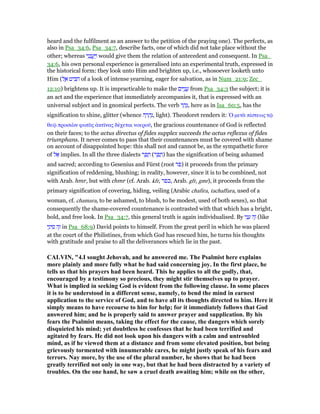
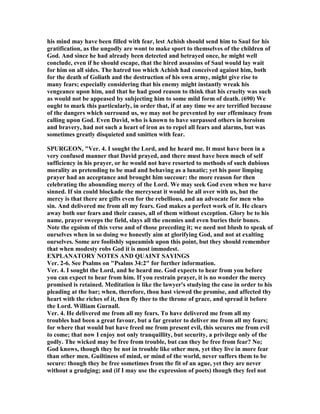
![always the whip of Tysiphone, yet they feel always her terrors; and, seeing the Lord
hath done this for me, hath delivered me from all my fears, have I not cause, just
cause, to magnify him, and exalt his name? Sir Richard Baker.
COKE, "Psalms 34:4. And delivered me from all my fears— This exactly answers to
the history; which informs us, that when David heard what the servants of Achish
said to their master concerning him, He laid up those words in his heart, and was
greatly afraid, 1 Samuel 21:13. Undoubtedly, he thought himself in extreme danger;
but, instead of removing their suspicions, and his own fears, by offering to join with
the Philistines against his country, he rather chose to counterfeit madness, and trust
Providence with the success of it, than secure his safety by base and dishonourable
compliances. Chandler.
TRAPP, "Psalms 34:4 I sought the LORD, and he heard me, and delivered me from
all my fears.
Ver. 4. I sought the Lord] Even when I was in the enemies’ hands, and playing my
pranks as a mad man among them; I prayed secretly and inwardly, I sent up some
ejaculations, as ehemiah 2:4, and was heard, though unworthy.
And delivered me out of all my fears] Which were not a few, 1 Samuel 21:13, besides
his inward terrors upon his unwarrantable practices to save his life. Sense fights
sore against faith, when it is upon its own dunghill (in a sensible danger I mean), to
the great disturbance of the conscience afterwards. George Marsh, afterwards a
martyr in Queen Mary’s days, being examined before the Earl of Derby, kept
himself close in the sacrament of the altar, as they called it. But afterward, thus he
writeth to a friend; I departed much more troubled in my spirit than before;
because I had not with more boldness confessed Christ, but in such sort as mine
adversaries thereby thought they should prevail against me; whereat I was much
grieved; for hitherto I went about, as much as in me lay, to rid myself out of their
hands, if by any means, without openly denying Christ and his word, that could be
done (Acts and Mon. fol. 1419). Thus he; but no rest he had in his mind till he had
better declared himself, though to the loss of his life. A man had better offend all the
world, than his own conscience. David, not without much ado, recovered his peace,
for which he here heartily blesseth God.
COFFMA , ""I sought Jehovah, and he answered me" (Psalms 34:4). What a
strange affinity these words have with Jonah 2:2. The surprise and shock of the
child of God when God answers his prayer is equaled only by the joyful
remembrance of it.
PETT, "Verse 4-5
2). He Rejoices In The Delivery Of Himself And His Men (4-7).
Psalms 34:4-5](https://image.slidesharecdn.com/psalm34commentary-160516140540/85/Psalm-34-commentary-33-320.jpg)
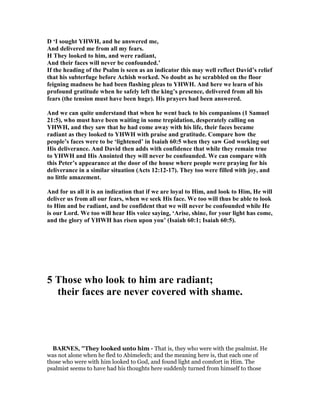
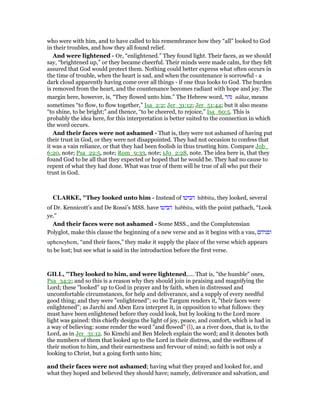
![so peace and pleasure.
HE RY 5-6, "Many besides him have looked unto God by faith and prayer, and have
been lightened by it, Psa_34:5. It has wonderfully revived and comforted them; witness
Hannah, who, when she had prayed, went her way, and did eat, and her countenance
was no more sad. When we look to the world we are darkened, we are perplexed, and at
a loss; but, when we look to God, from him we have the light both of direction and joy,
and our way is made both plain and pleasant. These here spoken of, that looked unto
God, had their expectations raised, and the event did not frustrate them: Their faces
were not ashamed of their confidence. “But perhaps these also were persons of great
eminence, like David himself, and upon that account were highly favoured, or their
numbers made them considerable;” nay, [3.] This poor man cried, a single person, mean
and inconsiderable, whom no man looked upon with any respect or looked after with any
concern; yet he was as welcome to the throne of grace as David or any of his worthies:
The Lord heard him, took cognizance of his case and of his prayers, and saved him out
of all his troubles, Psa_34:6. God will regard the prayer of the destitute, Psa_102:17.
See Isa_57:15.
JAMISO , "God’s favor to the pious generally, and to himself specially, is celebrated.
looked — with desire for help.
lightened — or, “brightened,” expressing joy, opposed to the downcast features of
those who are ashamed or disappointed (Psa_25:2, Psa_25:3).
CALVI , "5.They shall look to him, and shall flow to him. I have already intimated,
that this verse and the following should be read in connection with the preceding
verse. In relating his own experience David has furnished an example to others, that
they should freely and without fear approach God in order to present their prayers
before him. ow, he says that they shall come, and this too with a happy issue. The
first two verbs are expressed in the past time in the Hebrew; but I have,
notwithstanding, no doubt that the sentence ought to be explained thus: When they
shall have looked to him, and flowed to him, their faces shall not be ashamed. I have
therefore translated them in the future tense. David is not relating things which had
happened, but is commending the fruit of the favor which had been manifested to
himself. Some interpreters, I know, refer the words to him to David, (691) because
immediately after he speaks of himself in the third person. Others with greater
propriety explain it; of God himself. A difference of opinion also exists as to the
Hebrew verb נהרו , naharu, which some, supposing it to be derived from the root ,אור
or, render to be enlightened. (692) But, in my opinion, the natural signification of
the word appears very appropriate to this place; as if he had said, There shall now
be a mirror set forth, in which men may behold the face of God serene and merciful;
and therefore the poor and afflicted shall henceforth dare to lift up their eyes to
God, and to resort to him with the utmost freedom, because no uncertainty shall any
longer retard them or render them slothful. If, however, any one should prefer the
word enlighten, the meaning will be, They who formerly languished in darkness
shall lift up their eyes to God, as if a light had suddenly appeared unto them, and
they who were cast down and overwhelmed with shame, shall again clothe their](https://image.slidesharecdn.com/psalm34commentary-160516140540/85/Psalm-34-commentary-36-320.jpg)
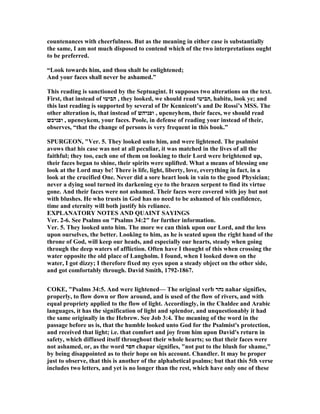
![initial letters. This verse is translated by many, Approach, or look unto the Lord,
and be enlightened, and your faces shall not be ashamed. See the versions, and
Houbigant. Fenwick renders it,
Who look to him, have always comfort found; one e'er do that, and go away
asham'd.
TRAPP, "Psalms 34:5 They looked unto him, and were lightened: and their faces
were not ashamed.
Ver. 5. They looked unto him, and were lightened] They, that is, my servants and
fellow soldiers who accompanied me first to ob, 1 Samuel 21:2; 1 Samuel 21:4,
Matthew 12:3-4, and afterwards to Gath (as it is probable); these being in the same
danger, looked likewise unto God by faith, hope, and prayer; and were lightened;
that is, comforted, cheered, directed, yea, delivered together with David. Or, they
flowed together, viz. to God, as rivers roll to the sea, or malefactors run to the
sanctuary, Isaiah 2:2; Isaiah 60:5.
And their faces were not ashamed] i.e. They were not repulsed, disappointed, made
to hide their heads, as Revelation 6:15-16.
COFFMA , ""They looked unto him, and were radiant" (Psalms 34:5). There is
indeed a radiance in the countenance of Christians that is clearly discernible,
contrasting sharply with the "fallen countenances" of the wicked. The ew
Testament tells us that when the rich young ruler decided against Jesus, that, "His
countenance fell" (Mark 10:22). Fallen countenances are visible by the hundreds
every day on every street corner.
But there is a spiritual likeness in the face of every true Christian to that of Moses
whose face shone when he came down from the mountain, and like Stephen when he
addressed the mob that murdered him in Jerusalem, of whom Luke tells us that,
"All that sat in the council saw his face as it had been the face of an angel" (Acts
6:15).
EXPOSITORS DICTIO ARY OF TEXTS, "Daily Prayer
Psalm 34:1-22
"As it is the special work of a shoemaker to make shoes," said Luther, "and of a
tailor to make coats, so it is the special work of a Christian to pray." The true artist
is an artist everywhere. His work in his studio is only a part of his artist life. So must
the pious soul be devoted to prayer; his prayers will be only a part of his praying
life. The servants of Madame de Chantal used to say of their mistress: "Madame"s
first Director made her pray three times a day, and everybody was upset. The new
Director makes her pray all day, and nobody suffers for it."](https://image.slidesharecdn.com/psalm34commentary-160516140540/85/Psalm-34-commentary-38-320.jpg)
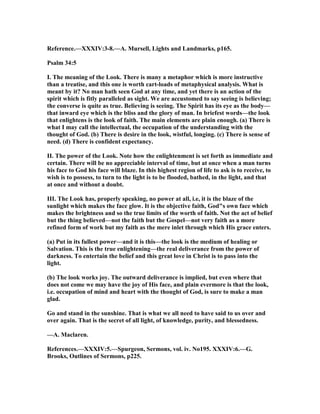
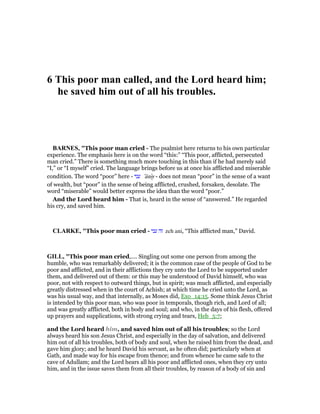
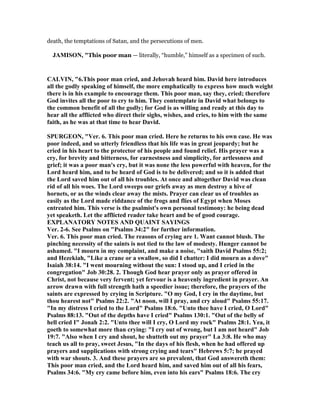
![addeth wings to the prayer, as a speedy post sent to court upon life and death: "Our
fathers cried unto thee, and were delivered" Psalms 22:5. "The righteous cry, and
the Lord heareth" Psalms 34:17. Samuel Rutherford.
COKE, "Psalms 34:6-7. This poor man cried— This seems to be the triumph of
David's afflicted friends for his safe return, says Chandler. "This distressed man
cried and sought the help of God, when he was in the greatest straits at Gath, as
being in danger of destruction if he stayed there, and yet not knowing how to
escape: but God heard his cry, and delivered him out of them all." The angel of the
Lord, in the next verse, does not mean a single angel; but a commanding angel,
ordering his forces to encamp round about those whom God commissions him to
preserve in safety. Dr. Delaney supposes these two verses to allude to Jacob, who
was at Mahanaim protected by two armies of angels; or perhaps, more particularly,
to the many distresses from which the Psalmist himself was delivered by the
gracious interposition of God.L
TRAPP, "Psalms 34:6 This poor man cried, and the LORD heard [him], and saved
him out of all his troubles.
Ver. 6. This poor man cried] Meaning himself, to whom it seemeth he pointed the
finger, or laid his hand on his heart, when he said, This poor man, Hic vilis, et
ovium pastor, saith Theodoret, this mean shepherd not long since; but rather, This
miserable sinner, who whilome rashly ran such a hazard, and so unworthily
deported himself in the presence of King Achish; this poor soul, I say, cried, but
silently and secretly, as Moses did at the Red Sea, as ehemiah did in the presence
of the king of Persia.
And the Lord] Who might better be called the poor man’s king, than was James IV,
king of Scotland.
Heard him, and delivered him out of all his troubles] And the like he will do for all
that, in like ease, being poor in spirit, make their humble addresses unto him. It is
good to communicate unto others our experiences. See the like done, Psalms 116:6,
Romans 8:2, 1 Timothy 1:15.
COFFMA , ""This poor man cried" (Psalms 34:6). The poor man here is none
other than David himself. Yes, he was indeed poor, hated and driven from the court
of King Saul, hunted like a wild beast, deserted by friends and neighbors, everyone
afraid to be seen in his presence or to come near him. Yes, at the time of this psalm
David was indeed poor.
PETT, "Verse 6-7
Z ‘This poor man cried, and YHWH heard him,
And saved him out of all his troubles.](https://image.slidesharecdn.com/psalm34commentary-160516140540/85/Psalm-34-commentary-42-320.jpg)
![CH The angel of YHWH encamps round about those who fear him,
And delivers them.’
David was duly humbled by his experiences, which, although he may not have
realised it, were preparing him for greater things. And when he thought back on
how he had escaped from Saul, and now from Achish, he recognised his own
weakness and helplessness in both situation, calling himself a ‘poor man’, lowly in
the sight of God and of men. He recognised himself for what he was. There was no
pretence or arrogance with David. He openly acknowledged his own undeserving,
and that he stood with the meek of Psalms 34:2. But he also recognised the goodness
of YHWH towards him, and was full of gratitude. Isaiah tells us in a similar vein
that ‘God dwells in the high and holy place -- with him who is of a contrite and
humble spirit, to revive the spirit of the humble, and to revive the heart of the
contrite one’ (Isaiah 57:15).
His experience had brought him out into a large place, for it had made him realise
that while Achish had been surrounded by his fierce warriors, he himself had had
even mightier protection. He had been under the protection of the Angel of YHWH,
Who had delivered him from all his troubles, in spite of their magnitude. It had
brought home to him that all who feared YHWH were ‘surrounded’ by the Angel of
YHWH, the very active presence of YHWH, and could therefore be sure of
deliverance. Compare how Paul also tells us that ‘your lives are hid with Christ in
God’ (Colossians 3:3). We too are ‘surrounded’ by the Angel of YHWH . We are
reminded here of the three men thrown into the fire because they stood firm for
God, only to find themselves accompanied there by one who was like the Son of God
Who kept them safe from harm (Daniel 3:25).
The Angel of YHWH is mentioned a number of times in the Old Testament. He can
speak of himself as YHWH, and yet is in some ways differentiated from YHWH (see
Genesis 16:10; Genesis 16:13 in context; Genesis 21:17-18; Genesis 22:11; Exodus
23:20; Judges 13:16-18; Zechariah 1:12-16; Zechariah 3:1-2). He is called ‘the Angel
of His presence’ (Isaiah 63:9). And there is inter-personal communication between
the Angel and YHWH (Zechariah 1:12). In this figure we have revealed to us, along
with the mention of ‘the Spirit of YHWH’, a first indication of the triunity of God.
SIMEO , "GRATEFUL RECOLLECTIO S
Psalms 34:6. This poor man cried; and the Lord heard him, and saved him out of all
his troubles.
IT is of great advantage to have transmitted to us the experience of God’s saints;
because in them we see exhibited, as it were, before our eyes, what we ourselves are
authorized to expect. David, in this psalm, records his deliverance from the hands of
Achish, king of Gath; who, there was every reason to fear, would have either put
him to death or delivered him into the hands of Saul, if God had not mercifully
interposed to prevent it. As for the means which David had recourse to, in order to
deceive Achish, I am not prepared either to justify or condemn them [ ote: 1
Samuel 21:13-15.]. To feign himself mad before Achish, was doubtless a very](https://image.slidesharecdn.com/psalm34commentary-160516140540/85/Psalm-34-commentary-43-320.jpg)
![humiliating measure. But, whether it was strictly correct or not, God was pleased to
make use of it for the deliverance of his faithful servant from the danger to which,
by fleeing to Gath, he had exposed himself: and David, in this psalm, commemorates
this gracious interposition, and records it for the benefit of the Church in all future
ages.
Let us consider the text,
I. As a grateful acknowledgment—
It is not necessary to confine our attention to the immediate occasion of the words,
since David uses nearly the same expression in reference to mercies received during
the rebellion of Absalom [ ote: Psalms 3:3-4. with the title of that Psalm.].
Throughout the whole of his life, David received marvellous mercies at the hands of
God—
[His temporal deliverances were great on numberless occasions, from the
persecutions of Saul — — — the assaults of enemies — — — and the rebellion of
Absalom — — — but from all his troubles God had saved him; and for this
salvation he did well to offer to God his most grateful acknowledgments [ ote: 2
Samuel 22:1-7.].
But what shall I say of the spiritual mercies vouchsafed to him? These were beyond
measure great, inasmuch as his terrors were sometimes of the most overwhelming
nature [ ote: Psalms 6:1-6; Psalms 40:12; Psalms 42:7.]— — — and his sins, of
almost unparalleled enormity [ ote: Psalms 25:11.] — — — But from all of these
had God delivered him, in answer to his prayers; and for these merciful
interpositions he most humbly and most thankfully adores his God [ ote: Psalms
40:1-3.] — — —]
And have not we also innumerable mercies, both temporal and spiritual, to
acknowledge?
[True in respect of temporal afflictions, none of us can bear any comparison with
him. But still there are few of us who have not experienced some deliverances; and
not one who has not reason to bless God, with all possible ardour, for his
forbearance, at least, if not also for his pardoning love. Let us call to mind the
various interpositions of our God in times of sickness, or trouble, or danger. But
more especially, it ever we have cried to God under a sense of our sins, and an
apprehension of God’s wrath, and have obtained mercy at his hands, what thanks
should not we also render to him for such marvellous mercies! Methinks if we do
not call upon all that is within us to bless his holy name, “the very stones will cry out
against us.”]
But David intended these words to be considered, also,](https://image.slidesharecdn.com/psalm34commentary-160516140540/85/Psalm-34-commentary-44-320.jpg)
![II. As an instructive record—
The whole preceding part of the psalm shews that it was written by him with this
view. “I will bless the Lord at all times: his praise shall be continually in my mouth.
My soul shall make her boast in the Lord: the humble shall hear thereof and be
glad. O magnify the Lord with me; and let us exalt his name together! I sought the
Lord, and he heard me, and delivered me from all my fears.” Yes, “This poor man
cried, and the Lord heard him, and saved him out of all his troubles [ ote: ver. 1–
6.].” Behold, then, how plainly it instructs us,
1. That there are no troubles so great, but God is able to deliver us from
them—
[ either our temporal nor our spiritual troubles can well exceed those of David: yet,
if he was saved from his, why may not we from ours? “Is God’s ear become heavy,
that it cannot hear; or is his hand shortened, that he cannot save [ ote: Isaiah
59:1.]?” We must on no account limit either the power or the mercy of our God: but
“be strong in faith, giving glory to his name [ ote: Romans 4:20.]”— — —]
2. That there are no troubles so great but God will deliver us from them, in
answer to our prayers—
[Who ever heard of any instance wherein God said to a man, “Seek my face in
vain?” Jonah was heard from the bottom of the sea; and David, as it were, from the
very gates of hell. Manasseh, too, was heard, and accepted, after all his great and
aggravated crimes [ ote: 2 Chronicles 33:12-13.]. Let none, then, despond, whatever
be his trouble, or whatever his guilt: but let all be assured, that if their faith be only
as a grain of mustard-seed, it shall prevail, to the casting of all the mountains,
whether of difficulty, or of sin, into the very depths of the sea [ ote: Matthew
17:20.] — — —]
3. That answers to prayer, so far from puffing up a man with pride, will
invariably humble and abase him—
[Who is it that here designates himself by this humiliating appellation, “This poor
man?” It is David, “the man after God’s own heart.” But did not God’s mercies to
him puff him up? Quite the reverse. He never was more humble than when most
honoured of his God. And so it was with Jacob in the Old Testament [ ote: Genesis
32:10-11.]; and with the Apostle Paul in the ew. If ever there was a man more
highly honoured than others, it was the Apostle Paul: yet he still continued to
account himself “less than the least of all saints [ ote: Ephesians 3:8.],” yea, and as
“the very chief of sinners [ ote: 1 Timothy 1:15.].” And so will divine grace operate
on us also. People imagine, that if we profess to have received special answers to
prayer, and to have obtained the forgiveness of our sins, we must, of necessity, be
elated with pride. But the very reverse of this was the effect produced on the minds
of Job, and of the prophet Isaiah, who only lothed themselves the more in
proportion as they were honoured of their God [ ote: Job 42:5-6 and Isaiah 6:5.]:](https://image.slidesharecdn.com/psalm34commentary-160516140540/85/Psalm-34-commentary-45-320.jpg)
![and thus it will be with every real saint: he will account himself “poor” even to his
dying hour, and will be ever ready to “prefer others in honour before himself [ ote:
Romans 12:10. Philippians 2:3.].”]
If, then, this retrospective view of God’s mercies be so sweet on earth,
1. What must it be, the very instant we arrive at the gates of heaven!
[At the moment of our departure from the body, we shall have a complete view of all
God’s dealings with us, whether in his providence or grace. And if here our partial
views of these things fill us with such joy and gratitude, what will a full discovery of
them do? As to any undue elevation of mind, on account of the mercies vouchsafed
to us, it will produce a directly contrary effect: for all the glorified saints cast their
crowns at the Saviour’s feet, and prostrate themselves before him, and sound no
other name than his [ ote: Revelation 5:8-10.]. And there they will have their
salvation altogether complete. o further “trouble” to all eternity will they
experience; for “all tears shall be wiped away from their eyes for ever [ ote:
Revelation 7:14-17.].” Oh! look forward to that day with holy delight: and let the
foretastes of it, which you here enjoy, stimulate your exertions to honour God, and
to obtain a meetness for the blessedness that awaits you.]
2. How earnest should you be in commending to others the Saviour you have
found!
[The Psalmist sets you the example: “Come and hear, all ye that fear God, and I will
declare what he hath done for my soul. I cried unto him with my mouth, and he was
extolled with my tongue. Verily, God hath heard me, and hath attended to the voice
of my prayer. Blessed be God, who hath not turned away my prayer, nor his mercy
from me [ ote: Psalms 66:16-20.]!” Thus, then, do ye also. Be not content to go to
heaven alone. Tell to those around you the efficacy of prayer; and extol the Saviour,
as “able to save to the uttermost all that come unto God by him.” Thus will you fulfil
the design of David in transmitting his experience to future ages; whilst you confirm
his testimony, by your acknowledgment that God is still as gracious as ever, and an
unchangeable Friend to all who come to him in his Son’s name.]
7 The angel of the Lord encamps around those
who fear him,
and he delivers them.](https://image.slidesharecdn.com/psalm34commentary-160516140540/85/Psalm-34-commentary-46-320.jpg)
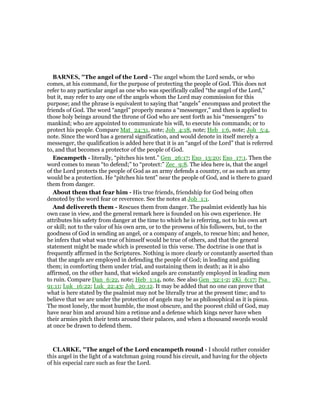
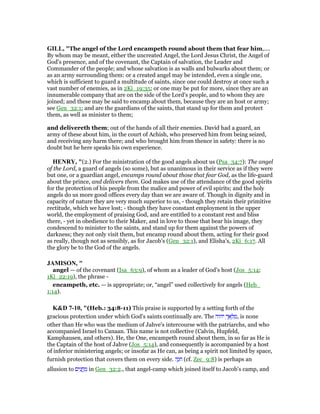
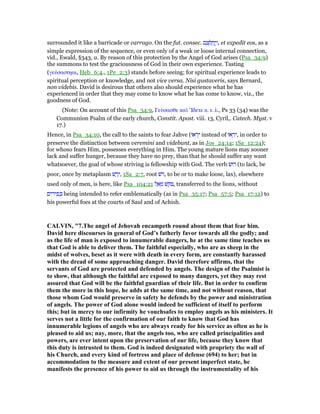
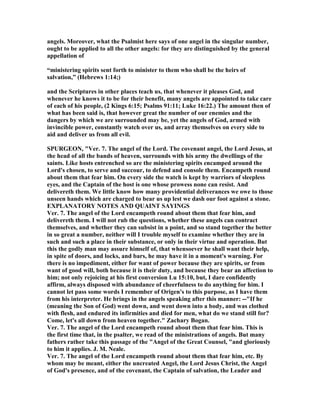
![Commander of the people; and whose salvation is as walls and bulwarks about
them, or as an army surrounding them; or a created angel may be intended, even a
single one, which is sufficient to guard a multitude of saints, since one could destroy
at once such a vast number of enemies, as in 2 Kings 19:35; or one may be put for
more, since they are an innumerable company that are on the side of the Lord's
people, and to whom they are joined; and these may be said to encamp about them,
because they are an host or army (see Genesis 32:1-2 Lu 2:13); and are the
guardians of the saints, that stand up for them and protect them, as well as minister
to them. John Gill.
Ver. 7. The angel of the Lord is represented in his twofold character in this pair of
Psalms, as an angel of mercy, and also as an angel of judgment, Psalms 35:6. This
pair of Psalms (the thirty-fourth and thirty-fifth), may in this respect be compared
with the twelfth chapter of the Acts of the Apostles, where the angel of the Lord is
displayed as encamping about St. Peter, and delivering him, and also as smiting the
persecutor, Herod Agrippa. Christopher Wordsworth, D.D.
Ver. 7. Round about. In illustration of this it may be observed, that according to
D'Arvieux, it is the practice of the Arabs to pitch their tents in a circular form; the
prince being in the middle, and the Arabs about him, but so as to leave a respectful
distance between them. And Thevenot, describing a Turkish encampment near
Cairo, having particularly; noticed the spaciousness, decorations, and conveniences
of the Bashaw's tent, or pavilion, adds, "Round the pale of his tent, within a pistol
shot, were above two hundred tents, pitched in such a manner that the doors of
them all looked towards the Bashaw's tent; and it ever is so, that they may have
their eye always upon their master's lodging, and be in readiness to assist him if he
be attacked." Richard Mant.
TRAPP, "Psalms 34:7 The angel of the LORD encampeth round about them that
fear him, and delivereth them.
Ver. 7. The angel of the Lord encampeth round about, &c.] ot one guardian angel
only, as some have hence conceited, nor Michael the archangel only, that angel of
the covenant, Jesus Christ, as Augustine expoundeth this text, but a host of created
angels, those ministering spirits, sent forth to minister for them who shall be heirs of
salvation, Hebrews 1:14. For although Christ, the Captain of our salvation, needeth
not their help for the safeguard of his people; yet for our comfort he maketh use of
the holy angels, who meet us still, as they did Jacob at Mahanaim (where they made
a lane for him, as the guard doth for their prince, as the word importeth), Genesis
32:1; they minister many blessings to us, though invisibly; stand at our right hands,
Luke 1:11, as ready to relieve us as the devils are to mischief us, Zechariah 3:1; yea,
they pitch camp round about us, Sicut hostes sunt in circuitu, (Kimchi), (oh the
dignity and safety of a saint in this respect!) fight in battle array against our
enemies, Daniel 10:20 (the heathens speak much of their Castor and Pollux fighting
for them and Hesiod telleth of thirty thousand demi-gods that were φυλακες
µεροπων ανθρωπων, keepers of mankind), and convey them at death, as they did
Lazarus, through the enemies’ country, the air, into Abraham’s bosom, Luke 16:22](https://image.slidesharecdn.com/psalm34commentary-160516140540/85/Psalm-34-commentary-51-320.jpg)
![COFFMA , ""The angel of Jehovah encampeth round about them that fear him.
And delivereth them.
Oh taste and see that Jehovah is good:
Blessed is the man that taketh refuge in him
Oh fear Jehovah, ye his saints;
For there is no want to them that fear him.
The young lions do lack, and suffer hunger;
But they that seek Jehovah shall not want any good thing."
"The angel of Jehovah" (Psalms 34:7). The angel of Jehovah is frequently
mentioned in the Old Testament. He appeared to Joshua as, "The Captain of the
host of the Lord" (Joshua 5:14), and also in the remarkable visions of Zechariah
9:8. "He is not merely an angelic messenger, but is in some sense identified with God
himself."[9]
We are amused that some scholars are concerned about how "The angel of
Jehovah" (in the singular) could "encamp around" them that fear the Lord.
Apparently, some writers have never heard of the ubiquitousness of the Almighty,
who is in fact everywhere throughout his whole universe at one and the same time!
As Delitzsch noted, "The angel of Jehovah, being a spirit not limited by space, can
furnish protection on every side."[10] Also, we might add, this protection is
available not only for just one of God's saints in a given location, but is provided for
all the saints on earth wherever they live. Is anything too hard for God?
What a great comfort it is to know that, "This great and mighty divine being from
days of old, who so often dealt with the patriarchs and figured so effectively in the
history of Israel is indeed our protector."[11]
"Taste and see that Jehovah is good" (Psalms 34:8). God has made it possible for
men to know whether or not his word is true. The person who receives it, obeys it,
and trusts its promises will shortly come to know, "Whom he has believed," having
"tasted the good Word of God and the powers of the age to come" (Hebrews 6:5),
and as Peter said, "Ye have tasted that the Lord is gracious" (1 Peter 2:3).
"For there is no want for them that fear him" (Psalms 34:9). See under Psalms
34:10, below, where this thought is repeated.
"The young lions do lack, and suffer hunger" (Psalms 34:10). Some interpreters
would see this as a metaphorical reference to the rich, or to the privileged of earth,
but such a view is totally unnecessary. "In God's animal creation, even the strongest](https://image.slidesharecdn.com/psalm34commentary-160516140540/85/Psalm-34-commentary-52-320.jpg)
![sometimes suffer hunger and want; but those who fear God shall not want any good
thing."[12]
"Shall not want any good thing" (Psalms 34:10). Dahood states that the Hebrew
here will bear the rendition, "shall not have a deficit," and that it "is an economic
term."[13]
EXPOSITORS DICTIO ARY OF TEXTS, "The Ministry of Angels
Psalm 34:7
I. There is something, I think, very touching in the first recorded message of an
Angel of God, and to our ears it may sound strangely. When Hagar fled from the
face of Sarai, the Angel of the Lord found her in the wilderness and said "Return to
thy mistress, and subdue thyself under her hands": Patience and self-control, such
are the earliest precepts which the messenger of heaven brings to a suffering
woman; but with them is combined a blessing, for He said, "I will multiply thy seed
exceedingly, that it shall not be numbered for multitude". From this beginning the
record of Divine providence flows on with even current through the age of
patriarchs. At Sodom, at Moriah, at Hebron, at Mahanaim, at Bethel, and in Egypt,
the patriarchs acknowledged the personal care of their God in the service of His
messengers.
II. The history of the family was a prelude to the history of the nation. In times of
rebellion and division, in times of despair and oppression, in times of sinful
confidence and of trustful self-abasement, the Angel of the Lord wrought among
Israel the issues of repentance and faith, of chastisement and victory, in the field of
Bochim, and by the brook Kishon, appearing to Gideon as he threshed wheat by
stealth, and to the wife of Manoah in her loneliness, stretching the destroying sword
over the city of David and sweeping with a pestilence through the camp of the
Assyrians. Meanwhile the prophets were unfolding wider views of the ancient faith.
The God of Israel appeared under the more glorious title of the Lord of Hosts. The
scene of His Majesty was transferred, as it were, from earth to heaven. The angels
were seen ministering to His glory or declaring His perfections. The way was
prepared for a spiritual kingdom; and Daniel was allowed to record the ministry of
spiritual power in Persia and Greece that all the nations of the world might work
together for the final establishment of the reign of Christ.
III. The age of prophets passed away, and with it the outward miracles of the first
dispensation. A people tried by prosperity and purified by suffering was left to trace
in the chequered course of life the Divine Presence which was before sensibly
revealed to them. In part they were strengthened to deeds of heroic valour by the
remembrance of past deliverance; in part they defaced the simplicity of the
Scriptural teaching by the admixture of Eastern superstition; but the belief still
lived, and in the fullness of time an angel announced to men the advent of the
Saviour. Angels foretold the birth of his forerunner. Angels proclaimed the nativity](https://image.slidesharecdn.com/psalm34commentary-160516140540/85/Psalm-34-commentary-53-320.jpg)
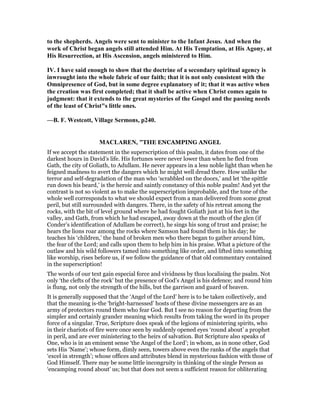
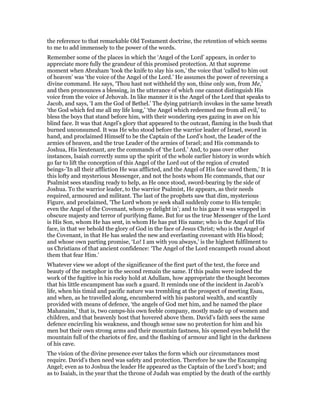
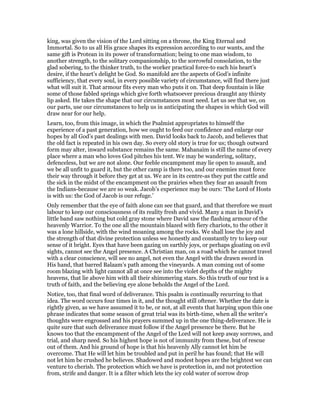
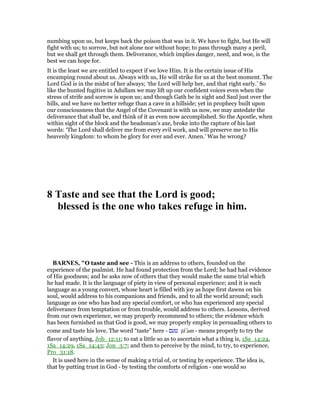
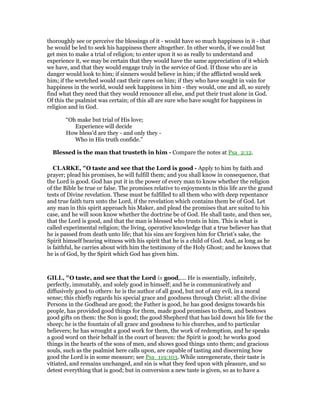
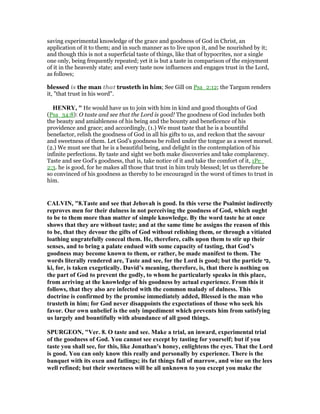
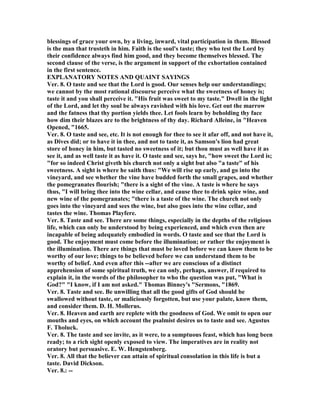
![O taste the Lord, and see how sweet He is,
The man that trusts in him lives still in bliss. Sir John Davies, 1569-1626.
Ver. 8-10. All these verses are beautiful representations of the fulness, suitableness,
completeness, and all sufficiency of God in Christ to answer all the wants of his
people. And is there not a vast elegance in the comparison taken from the hunger
and rapacity of the lion, even the impetuousness of the young lion, to that of the
patience and silent waiting of the faithful believer? A life of faith will find food in
everything, because it is all founded in Christ. The young lions may, and will lack,
because nothing will supply their voracious appetites but that which is carnal.
Robert Hawker.
TRAPP, "Psalms 34:8 O taste and see that the LORD [is] good: blessed [is] the man
[that] trusteth in him.
Ver. 8. O taste and see, &c.] viz. With the mouth of your mind, and with the eyes of
your faith perceive, and experiment the goodness of God in choosing and using such
instruments as the angels, and otherwise, in the manifold expressions of his love to
us; wherein if we take not comfort the fault is merely in ourselves; we being like him
who hath pleasant and nourishing meat, but will not make use of it. The saints taste
how good the Lord is, and thence long after him. Optima demonstratio est a
sensibus. As he that feels fire hot, or as he that tasteth honey sweet, ye need not use
arguments to persuade him to believe it; so here, let a man but once taste that the
Lord is good, and he will thenceforth, as a new born babe, desire the sincere milk of
the word, 1 Peter 2:2-3, neither will he take any more content in the world’s tasteless
fooleries than in the white of an egg or a dry chip. Gustato spiritu desipit omnis
caro, saith Gerson, All flesh is savourless to him that hath tasted of the Spirit. Paul,
after his rapture, looked with scorn and pity on all the world’s glittering poverty.
His mouth doth not water after homely provisions, who hath lately tasted of delicate
sustenance. Oh, let us get spiritual senses habitually exercised to discern good and
evil, Hebrews 5:14. It is the Spirit that quickeneth, the flesh profiteth nothing, saith
our Saviour to the Jews: q.d. Ye accept my words because ye have not the Spirit, ye
have but flesh, that is, a common knowledge, no sound taste; and therefore it is that
my words relish not with you.
Blessed is the man, &c.] See Psalms 2:12. {See Trapp on "Psalms 2:12"}
PETT, "Verses 8-11
3). He Calls On The People To Taste Of YHWH, And To Learn To Fear Him (8-11).
Psalms 34:8-11
T ‘Oh taste and see that YHWH is good,
Blessed is the strong man (gbr) who takes refuge in him.
Y Oh fear YHWH, you his saints,
For there is no want to those who fear him.
C The young lions do lack, and suffer hunger,](https://image.slidesharecdn.com/psalm34commentary-160516140540/85/Psalm-34-commentary-61-320.jpg)
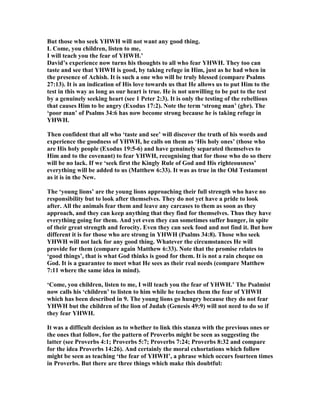
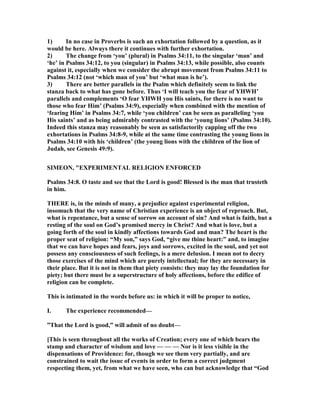
![is good to all, and that his tender mercy is over all his works?” — — — But most of
all does his goodness appear in the great mystery of redemption. Who can reflect on
that stupendous act of mercy, the giving of his only-begotten Son to die for us, and
to bear our sins in his own body on the tree? Who can reflect on the sending of his
Holy Spirit to instruct and sanctify us, and on the providing for his people an
inheritance, incorruptible and undefiled, and never-fading, reserved for them in
heaven? Who, I say, can take ever so slight a survey of these wonders, and not say
with the Psalmist, “O how great is thy goodness, which thou hast laid up for them
that fear thee; which thou hast wrought for them that trust in thee before the sons of
men [ ote: Psalms 31:19.]! — — —]
Let us, then, “taste and see how good the Lord is”—
[A man who had been immured all his days in a dungeon would have no conception
of the radiance of the sun, in comparison of that which he would acquire by being
subjected to the action of its meridian rays: nor will a person who has merely
heard,and read of God’s goodness be able to form an estimate of it, in comparison of
what he would after having had “the love of God shed abroad in his heart by the
Holy Ghost.” In the one state he might say, “I have heard of thee by the hearing of
the ear;” but, on his transition from it, he might add, “ ow mine eye seeth thee.”
This is what I would wish respecting you: I would wish all “the goodness of God to
pass before you,” if not in visible splendour and in audible sounds, yet in a way
perceptible to the organs of faith.
But how is this to be attained? I answer, As Moses was put into the clift of the rock,
that he might be capable of sustaining the manifestations of God’s glory [ ote:
Exodus 33:18-19.], so you must “be found in Christ;” and then you shall behold all
“the glory of God shining forth in his face.”]
That we may be stirred up to seek this experience, let us notice,
II. The blessedness resulting from it—
A just view of God’s goodness will lead us to trust in him—
[”They that know thy name,” says David, “will put their trust in thee,” They will go
to him with all their guilt to be pardoned, and all their corruptions to be mortified,
and all their wants to be supplied. Those who know him not, are ever prone to limit
either his power or his willingness to save: but those who have “tasted how gracious
he is [ ote: 1 Peter 2:3.],” will commit to him their every concern, and trust him for
body and for soul, for time and for eternity — — —]
And need I ask, whether persons so doing shall be “blessed?”
[Verily it is not in the power of language to declare the full extent of their
blessedness. What tranquillity possesses their minds! It is well said, that “their
peace passeth understanding,” and their “joy is unspeakable and glorified.”](https://image.slidesharecdn.com/psalm34commentary-160516140540/85/Psalm-34-commentary-64-320.jpg)
![Conscious as they are of their ill desert, they nevertheless feel assured of mercy
through the blood of sprinkling. Sensible as they are of a “body of sin and death,”
and almost sinking under its weight, they yet can say, “Thanks be to God, who
giveth us the victory through our Lord Jesus Christ!” Knowing by bitter experience,
also, the power and subtlety of Satan, they yet anticipate a final victory over him,
and doubt not but that he shall soon be for ever “bruised under their feet.” As for
death, they have learned to number it amongst their treasures [ ote: 1 Corinthians
3:22.]: and they look forward to a habitation infinitely better than any that this
world can afford, even to “a house not made with hands, eternal in the heavens.”
In every view that can be conceived, these persons are blessed; as indeed the whole
Scripture testifies: but more especially does David assure us of it, when, in a solemn
appeal to God himself, he says, “O Lord God of Hosts, blessed is the man that
trusteth in thee [ ote: Psalms 84:12.].”]
Address—
Are there any amongst you who doubt the blessedness of religion?
[Sure I am, that you can never have had any just experience of it. And what would
you yourselves say to any one who should presume, under such circumstances, to
judge of earthly things? Would you not reply, you are incompetent to judge? So,
then, I say to you, Go first and taste whether God be not good to them that seek him.
If you can truly say, that you have sought him with deep penitential sorrow, and he
has shut up his bowels of compassion from you; that you have prostrated yourselves
at the foot of the cross, and the Lord Jesus has spurned you from his foot-stool; and
that you have truly and unreservedly given yourselves up to God, and he has denied
you the assistance of his grace; if you will say, that, whilst you have thus turned with
your whole heart to God, and retained no allowed sin within you, God has cast out
your prayer, and refused to be gracious unto you; I will allow you to be judges in
this matter. But where is the man that will dare to stand up and say to the Lord
Jesus Christ, ‘Thou hast declared that thou wouldst “on no account cast out any
who came to thee;” but thou hast falsified thy word in reference to me, and suffered
me to seek thy face in vain?’ o: there never yet existed an occasion for such a
reproach, nor ever shall, as long as the world shall stand. I say, then, that those who
doubt the blessedness of true religion are in darkness even to this very hour, and
“speak evil of the things which they understand not.” And, if they pretend that they
have endeuvoured to taste whether God were good, and found him not to be so, I
hesitate not to say, that the fault has not been in God, but in themselves, in that their
taste has been vitiated, and their souls rendered incapable of spiritual discernment.]
To those who have “tasted that the Lord is gracious,”
[I would say, Be not satisfied with a taste. God invites you to “eat and drink
abundantly [ ote: Song of Solomon 5:1.],” till you are even “satisfied with his
goodness [ ote: Jeremiah 31:14.].” Such is your privilege, as David has declared:
“How excellent is thy loving-kindness, O God! therefore shall the children of men](https://image.slidesharecdn.com/psalm34commentary-160516140540/85/Psalm-34-commentary-65-320.jpg)
![put their trust under the shadow of thy wings: they shall be abundantly satisfied
with the fatness of thy house; and thou shalt make them drink of the river of thy
pleasures [ ote: Psalms 36:7-8.].”
And be careful that you do not become “weary of the Lord.” We read of some, who,
having “tasted of the heavenly gift, and been made partakers of the Holy Ghost, and
having tasted the good word of God, and the powers of the world to come, yet so fell
away, as never to be renewed unto repentance [ ote: Hebrews 6:6.].” Beware, lest
that ever become your state. Beware, lest ye so “crucify the Son of God afresh, and
put him to an open shame.” If men who have never tasted of his grace commit
iniquity, they bring no particular disgrace upon religion: but if you, who profess
godliness, offend, you cast a stumbling-block before the whole world; who conclude,
from what they see in you, that there is not a sufficiency of love in Christ to make
you happy, or of grace to make you holy. I pray you, bring not such dishonour upon
him, or such guilt upon your own souls: but so “acquaint yourselves with him, that
you may be at peace;” and so delight yourselves in him, that “your souls may be
satisfied as with marrow and fatness, whilst you are praising him with joyful lips
[ ote: Psalms 63:5.].”]
9 Fear the Lord, you his holy people,
for those who fear him lack nothing.
BAR ES, "O fear the Lord - Reverence him; honor him; confide in him. Compare
Psa_31:23.
Ye his saints - His holy ones. All who profess to be his friends. This exhortation is
addressed especially to the saints, or to the pious, because the speaker professed to be a
friend of God, and had had personal experience of the truth of what he is here saying. It
is the testimony of one child of God addressed to others, to encourage them by the result
of his own experience.
For there is no want to them that fear him - All their needs will be abundantly
supplied. Sooner or later all their real necessities will be met, and God will bestow upon
them every needed blessing. The statement here cannot be regarded as absolutely and
universally true - that is, it cannot mean that they who fear the Lord will never, in any
instance, be hungry or thirsty, or destitute of raiment or of a comfortable home; but it is](https://image.slidesharecdn.com/psalm34commentary-160516140540/85/Psalm-34-commentary-66-320.jpg)
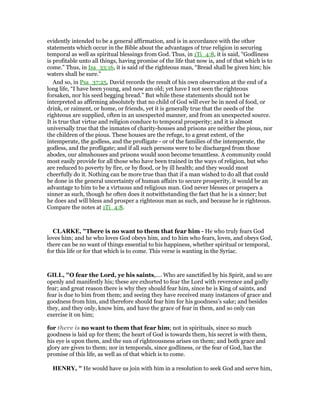
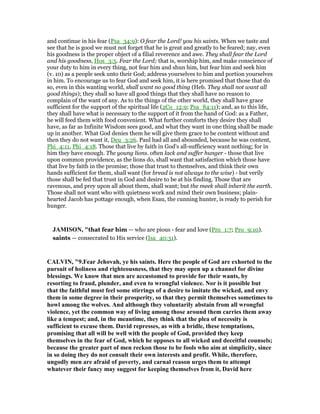
![testifies that God takes care of the godly, so that he never suffers them to be in want.
Let no fear or distrust, says he, withdraw you from the pursuit of what is right,
because God never forsakes those who walk righteously before him. The Psalmist,
therefore, bids them yield to God the honor of expecting more from him alone than
the wicked expect from their deceitful traffic and unlawful practices. Moreover, as
iniquity rages with unbridled fury everywhere throughout the world, he calls
expressly upon the saints to be on their guard, because he would be of no service to
the promiscuous multitude. It is a sentiment contrary to the generally received
opinion among men, that while the integrity of the good and simple is exposed to the
will of the wicked, there should yet be greater security in integrity than in all the
resources of fraud and injustice. There is, therefore, no inconsistency in his
admonishing the saints who, of their own accord, are endeavoring to walk uprightly,
not to depart from the fear of God; for we know how easily the light of piety may be
obscured and extinguished, when there appears no hope of living happily and
prosperously, except in the pursuit of the world and its enticing pleasures.
SPURGEO , "Ver. 9. O fear the Lord, ye his saints. Pay to him humble childlike
reverence, walk in his laws, have respect to his will, tremble to offend him, hasten to
serve him. Fear not the wrath of men, neither be tempted to sin through the
virulence of their threats; fear God and fear nothing else. For there is no want to
them that fear him. Jehovah will not allow his faithful servants to starve. He may
not give luxuries, but the promise binds him to supply necessaries, and he will not
run back from his word. Many whims and wishes may remain unfulfilled, but real
wants the Lord will supply. The fear of the Lord or true piety is not only the duty of
those who avow themselves to be saints, that is, persons set apart and consecrated
for holy duties, but it is also their path of safety and comfort. Godliness hath the
promise of the life which now is. If we were to die like dogs, and there were no
hereafter, yet were it well for our own happiness' sake to fear the Lord. Men seek a
patron and hope to prosper; he prospers surely who hath the Lord of Hosts to be his
friend and defender.
TRAPP, "Psalms 34:9 O fear the LORD, ye his saints: for [there is] no want to them
that fear him.
Ver. 9. O fear the Lord, ye his saints] Ye that, having tasted of God’s sweetness, are
separated from the world with its lusts, and can live with a little αγιοι quasi αγειοι,
fear the Lord, and then you shall not need to fear want of anything; for he is all-
sufficient to those who are altogether his, and withdraw not from him by mistrust or
misdoing.
For there is no want to them that fear him] Habent omnia, qui habent habentem
omnia. David, when captive among the Philistines, wanted not. Paul had nothing,
and yet possesed all things. Contrarily, the wicked, in the fulness of his sufficiency,
is in straits, Job 20:22.](https://image.slidesharecdn.com/psalm34commentary-160516140540/85/Psalm-34-commentary-69-320.jpg)
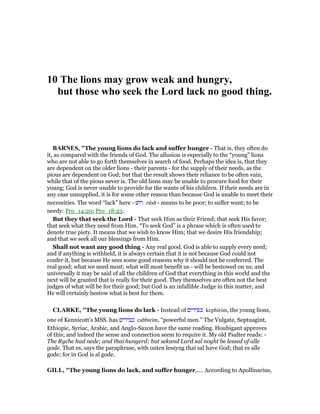
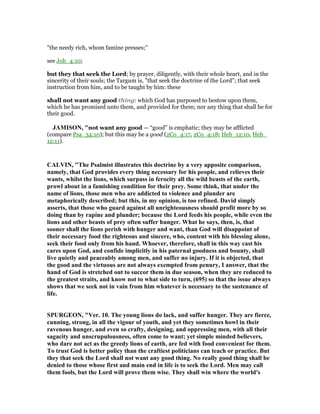
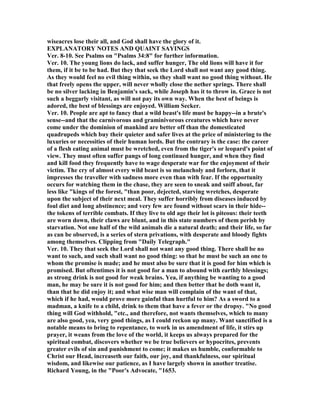
![Ver. 10. I remember as I came through the country, that there was a poor widow
woman, whose husband fell at Bothwell: the bloody soldiers came to plunder her
house, telling her they would take all she had. "We will leave thee nothing, "said
they, "either to put in thee, or on thee." "I care not, "said she, "I will not want as
long as God is in the heavens." That was a believer indeed. Alexander Peden's
Sermon, 1682.
Ver. 10. Take a survey of heaven and earth and all things therein, and whatsoever
upon sure ground appears good, ask it confidently of Christ; his love will not deny
it. If it were good for you that there were no sin, no devil, no affliction, no
destruction, the love of Christ would instantly abolish these. ay, if the possession of
all the kingdoms of the world were absolutely good for any saint, the love of Christ
would instantly crown him monarch of them. David Clarkson.
Ver. 10. (last clause). Part of his last afternoon was spent by Columba, in
transcribing the Psalms of David. Having come to that passage in the thirty-fourth
Psalm, where it is said, They that seek the Lord shall not want any good thing, he
said, "I have come to the end of a page, and I will stop here, for the following Psalms
34:11, "Come, ye children, hearken unto me: I will teach you the fear of the Lord,
"will better suit my successor to transcribe than me. I will leave it, therefore, to
Baithen." As usual the bell was rung at midnight for prayers. Columba was the first
to hasten to church. On entering it soon after, Dermid found him on his knees in
prayer, but evidently dying. Raising him up in his arms, he supported his head on
his bosom. The brethren now entered. When they saw Columba in this dying
condition they wept aloud. Columba heard them. He opened his eyes and attempted
to speak, but his voice failed. He lifted up his hands as if to bless them, immediately
after which he breathed out his spirit. His countenance retained in death the
expression it wore in life, so that it seemed as if he had only fallen asleep. "Story of
Columba and his successors, "in the Christian Treasury for 1848.
COKE, "Psalms 34:10. The young lions do lack— All the ancient versions, except
the Chaldee, read great, powerful men, instead of young lions; and Houbigant
renders the place, rich men are become poor and hungry; but they who seek the
Lord, &c. This sense is undoubtedly good: but I see nothing to object against our
own reading; for the meaning is, that if God takes care of the beasts of the field,
much more will he take care of them that fear him; and much sooner suffer those to
die for want of their prey, than these to perish through the want of necessaries or
the failure of his protection. The original word כפירים kphirim, signifies rather lions
of prey, than young lions. See Chandler and Schultens on Proverbs 30:12.
TRAPP, "Psalms 34:10 The young lions do lack, and suffer hunger: but they that
seek the LORD shall not want any good [thing].
Ver. 10. The young lions do lack and suffer hunger] And yet they will have it, if it is
to be had. Haec est sceleratorum imago, saith Beza. Lionlike wicked oppressors, rich
cormorants, as the Septuagint render it, who live on the spoil of poor people, and
are never satisfied, do yet perish with famine, as Eliphaz saith of the old lion, Job
4:11; and come oft to great poverty, so that they pine away and miserably perish,](https://image.slidesharecdn.com/psalm34commentary-160516140540/85/Psalm-34-commentary-73-320.jpg)
![Donec misere tabescant (Beza.)
But they that seek the Lord] That, content with his blessing alone, seek not their
nourishment any other way but from his hand, and will rather lie in the dust than
rise by evil principles; these have an autarky, a self-sufficiency, such as godliness is
never without, 1 Timothy 6:6. Some Rabbis say (Aben Ezra in loc.) that the servants
of Achish had almost famished David (under pretence haply of reducing him to his
right mind), but God sustained him by miracle, as he did Elias, 1 Kings 17:6; 1
Kings 17:14
Shall not want any good thing] Want they may, this or that, which they may think
would be good for them; but God knoweth it to be otherwise; or else they should be
sure of it. Of good nothing followeth of itself but good, but if by accident any evil
followeth, yet it is turned into good to such as seek the Lord in sincerity.
MACLARE , "STRUGGLING AND SEEKING
If we may trust the superscription of this psalm, it was written by David at one of the
very darkest days of his wanderings, probably in the Cave of Adullam, where he had
gathered around him a band of outlaws, and was living, to all appearance, a life
uncommonly like that of a brigand chief, in the hills. One might have pardoned him if, at
such a moment, some cloud of doubt or despondency had crept over his soul. But
instead of that his words are running over with gladness, and the psalm begins ‘I will
bless the Lord at all times, and His praise shall continually be in my mouth.’ Similarly
here he avers, even at a moment when he wanted a great deal of what the world calls
‘good,’ that ‘they that seek the Lord shall not want any good thing.’ There were lions in
Palestine in David’s time. He had had a fight with one of them, as you may remember,
and his lurking place was probably not far off the scene of Samson’s exploits. Very likely
they were prowling about the rocky mouth of the cave, and he weaves their howls into
his psalm: ‘The young lions do lack, and suffer hunger: but they that seek the Lord shall
not want any good.’
So, then, here are the two thoughts-the struggle that always fails and the seeking that
always finds.
I. The struggle that always fails.
‘The young lions do lack, and suffer hunger.’ They are taken as the type of violent effort
and struggle, as well as of supreme strength, but for all their teeth and claws, and lithe
spring, ‘they lack, and suffer hunger.’ The suggestion is, that the men whose lives are one
long fight to appropriate to themselves more and more of outward good, are living a kind
of life that is fitter for beasts than for men. A fierce struggle for material good is the true
description of the sort of life that hosts of us live. What is the meaning of all this cry that
we hear about the murderous competition going on round us? What is the true character
of the lives of, I am afraid, the majority of people in a city like Manchester, but a fight
and a struggle, a desire to have, and a failure to obtain? Let us remember that that sort
of existence is for the brutes, and that there is a better way of getting what is good; the
only fit way for man. Beasts of prey, naturalists tell us, are always lean. It is the
graminivorous order that meekly and peacefully crop the pastures that are well fed and](https://image.slidesharecdn.com/psalm34commentary-160516140540/85/Psalm-34-commentary-74-320.jpg)
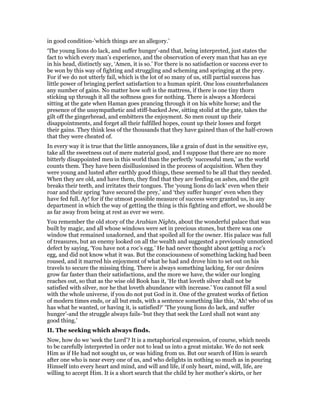
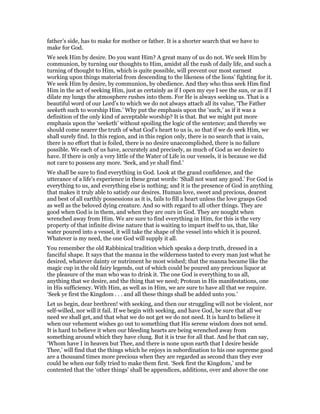
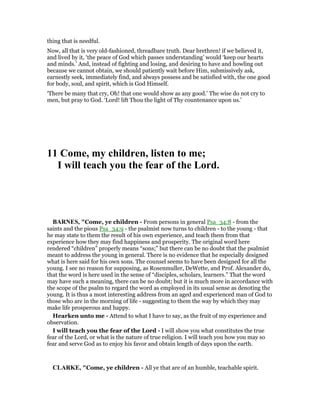
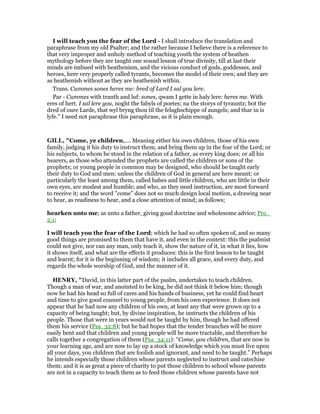
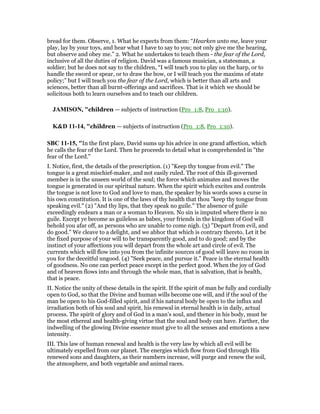
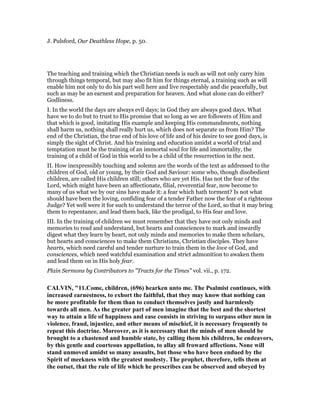
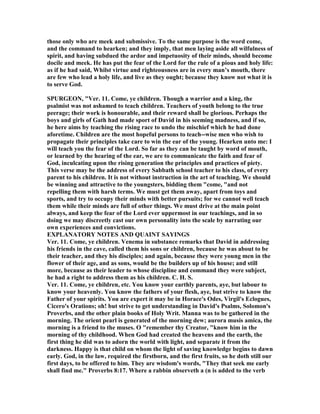
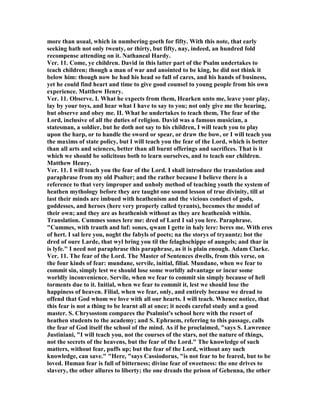
![opens the kingdom of heaven." J. M. eale.
Ver. 11. The fear of the Lord. Let this, therefore, good children, be your principal
care and study: for what shall it avail you to be cunning in Tully, Virgil, Homer,
and other profane writers, if you be unskilful in God's book? to have learned Greek
and Latin, if you learn not withal the language of Canaan? to have your speech
agreeable to the rules of Priscian, of Lily, if your lives and courses be not consonant
to the rules and laws of Christianity? to have knowledge of the creatures when you
are ignorant of the Creator? to have learned that whereby you may live a while
here, and neglect that whereby you may live eternally hereafter? Learn to fear God,
to serve God, and then God will bless you; for "He will bless them that fear him,
both small and great." Psalms 115:13. Thomas Gataker's "David's Instructor,
"1637.
TRAPP, "Psalms 34:11 Come, ye children, hearken unto me: I will teach you the
fear of the LORD.
Ver. 11. Come, ye children, hearken unto me] Ye that are little and low in your own
eyes, as seeing your want of holy learning.
I will teach you the fear of the Lord] That best trade, whereby you shall be sure to
be kept from want; for by humility and the fear of the Lord are riches, and honour,
and life, Proverbs 22:4. He, then, who shall teach this fear should be honoured, and
respected as a father. The Jews at this day account a man’s teacher, or tutor, worthy
of more respect than his father; for he hath given him only his being, the other his
well being (Leo Modena).
COFFMA , ""Come ye children, hearken unto me:
I will teach you the fear of Jehovah.
What man is he that desireth life,
And loveth many days, that he may see good?
Keep thy tongue from evil,
And thy lips from speaking guile.
Depart from evil, and do good;
Seek peace, and pursue it."
"I will teach you the fear of Jehovah" (Psalms 34:11). "David was a famous
musician, a statesman, and a great soldier; but he does not say, `I will teach you to
play on the harp,' or `how to handle the sword, or the spear, or to draw the bow,'
nor, `to know the maxims of state policy,' but `I will teach you the fear of the](https://image.slidesharecdn.com/psalm34commentary-160516140540/85/Psalm-34-commentary-83-320.jpg)
![Lord.'"[14]
The knowledge that David here proposed to teach the young is the best knowledge
of all; it is better than knowing all of the sciences, all of the arts, and all of the
secrets of making war. Today, many a learned man is simply an ignoramus unless
he also knows the Lord.
"What man is he that desireth life" (Psalms 34:12)? David's method of teaching
here follows the classical pattern of throwing out a question and then providing the
answer. "This method was a habit with David."[15] We have already encountered it
in Psalms 15; Psalms 24, and Psalms 25. otice that David here gives preeminence to
the avoidance of sins of the tongue, reminding us of the words of James who said
that, "If a man stumbleth not in word, the same is a perfect man" (James 3:2).
The few things mentioned here by David are merely a few token things that suggest
a truly righteous life in its fulness and obedience of the truth. This type of figure of
speech is frequently used in the ew Testament. One or two, or a very few, related
things are mentioned as a metaphor standing for the whole list! This type of
metaphor is called a synecdoche, In the ew Testament, the most famous example of
this is, "We are justified by faith," not meaning, of course, that we are justified by
"faith alone," but by all of those Christian qualities of which `faith' is a prominent
part.
SIMEO , "THE FEAR OF GOD I CULCATED
Psalms 34:11-16. Come, ye children, hearken unto me; I will teach you the fear of
the Lord. What man is he that desireth life, and loveth many days, that he may see
good? Keep thy tongue from evil, and thy lips from speaking guile. Depart from evil,
and do good: seek peace, and pursue it. The eyes of the Lord are upon the righteous,
and his ears are open unto their cry. The face of the Lord is against them that do
evil.
TO enlighten a dark world, and to guide wanderers into the paths of peace and
holiness, is the most glorious office that can be committed to a human being. So at
least David thought: for though he was well qualified to teach men the science of
music (in which he eminently excelled), or the art of war (in which he was a great
proficient), or the principles by which states and kingdoms should be governed, he
considered none of those employments comparable to that of instructing men in the
principles and practice of true religion. As a prophet of the Lord, (for at the time the
psalm was written he was not yet exalted to the throne of Israel,) he regarded all, to
whom he had accesss, as his children; and was anxious, as a loving parent, to gain
their attention, that he might instil into their minds those truths which he himself
felt to be of supreme importance. He wished in particular to shew them, what we
also are desirous to point out to you,
I. Wherein the fear of the Lord consists—](https://image.slidesharecdn.com/psalm34commentary-160516140540/85/Psalm-34-commentary-84-320.jpg)
![The fear of the Lord is such a reverential regard to him as inclines us to walk in all
things according to his revealed will, and to approve ourselves to him,
1. In our words—
[“Out of the abundance of the heart the mouth will speak;” and every evil that is in
the heart will betray itself by the tongue. Truly the tongue is justly called an unruly
member: like a helm of a ship, it is but a small matter; but it boasteth great things.
It is declared by God himself to be “a world of iniquity,” “a fire, setting in flames
the course of nature, and itself set on fire of hell.” So untameable is it, that the man
who bridles it on all occasions is pronounced to be “a perfect man:” whilst, on the
other hand, the man who has no command over it, however religious he may fancy
himself, or be thought by others, is a self-deceiver, whose religion is vain [ ote: See
James 3:2-8.]. It is therefore with great propriety that David specifies the control of
the tongue as the first evidence of the fear of God; “Whoso desireth life, let him keep
his tongue from evil, and his lips from speaking guile.” ot only must all profane
speeches and all impure communications be forborne, but every thing that is false
and deceitful, or corrupt in any way whatever. Every proud, angry, passionate,
revengeful word must be suppressed, whatever may be the provocation to utter it:
all calumny, detraction, uncharitableness, tale-bearing, must be avoided, and “the
law of truth and of kindness be continually in the lips.” God has said, that “of every
idle word we must give account in the day of judgment,” and that “by our words we
shall be either justified or condemned;” and therefore the fear of the Lord must of
necessity cause us to “take heed to our ways, that we sin not with our tongue.”]
2. In our actions—
[Sin is “that abominable thing which God hates:” and it should be universally and
irreconcileably hated by us: “We must depart from evil, and do good.” Whatever
evil we may have been most tempted, and most accustomed, to commit, that is the
evil against which we must most watchfully guard, and from which we must most
resolutely depart — — — On the other hand, we must be occupied in doing good.
The doing of good should be the great business of life: first, the doing good to our
own household; then to all our neighbours; then to the Church of God at large. The
devising of good, and the executing of good, and the uniting with others in the good
devised by them, and the stirring up all around us to do good according to their
opportunities and ability; this is a life worthy of a Christian, and necessarily flowing
from the fear of God. If we truly fear God, we shall “abhor that which is evil, and
cleave (be glued) to that which is good,” and “be fruitful in all the fruits of
righteousness which are by Jesus Christ to the glory and praise of God.”]
3. In our whole spirit and temper—
[A peaceful, loving spirit will characterize every child of God. “God is love;” and all
his children will resemble him in this glorious attribute. True it is, that it is not
always possible to be at peace, because some are so wicked and unreasonable that
they will take occasion even from our very peacefulness to injure us the more. Hence](https://image.slidesharecdn.com/psalm34commentary-160516140540/85/Psalm-34-commentary-85-320.jpg)
![St. Paul says, “If it be possible, as much as lieth in you, live peaceably with all men.
Whether we succeed or not, our constant aim and effort must be for peace. For the
preservation of it we should account no sacrifice too great: and we should be as
studious to promote it amongst others, as to preserve it with ourselves. If we see an
unkind spirit prevailing any where, we should endeavour to extinguish the fire, and
not, by countenancing it, add fuel to the flame. The evil of contention is so great that
no one who possesses heavenly wisdom will engage in it Himself, or encourage it in
others [ ote: James 3:13-18.]. If we fear the Lord indeed, our constant labour will
be to “keep the unity of the Spirit in the bond of peace.”]
Whilst explaining thus wherein the fear of the Lord consists, the Psalmist points out,
II. The importance of cultivating it in our own hearts—
As for those who had no concern about their souls, he did not expect them to
hearken to such self-denying lessons as he endeavoured to inculcate: but to those
who desired true happiness in this world and the next, he gave the advice which we
have already considered [ ote: ver. 12.]. To enforce his advice, he assured them of,
1. God’s favour to them that fear him—
[“The eyes of the Lord,” says he, “are upon the righteous, and his ear is open to
their cry.” ot a moment are they out of his sight, nor for a moment is he inattentive
to their prayers. Are they in danger? He will protect them, and cause his angel to
encamp around them, that no enemy may approach to hurt them [ ote: ver. 7.] —
— — Are they in want? He will supply them with all that is needful for them. “The
lions that could prey upon them shall want and suffer hunger; but they shall want
no manner of thing that is good,” for body or for soul, for time or for eternity [ ote:
ver. 9, 10.] — — — Are they in trouble? He will assuredly in due time interpose to
deliver them. They may have many troubles: but he will deliver them from all, the
very instant they have accomplished their destined office [ ote: ver. 17, 19.]. He
sends the trials to purify them from their dross: and he sits by the furnace, ready to
bring them out, in the proper season, “purified as gold.” Are they longing for his
presence here, and his glory hereafter? He will “be nigh unto their souls” in this
world, and will save them in the Lord Jesus Christ with an everlasting salvation in
the world to come [ ote: ver. 18.]. In a word, there shall be an infinite distance
between them and others: for they shall enjoy all the richest blessings of
redemption, whilst those who cast off the fear of God shall be left inconsolably and
for ever desolate [ ote: ver. 21, 22.]. What inducements are here to seek that holy
disposition of mind inculcated in our text!]
2. His indignation against those who fear him not—
[God does not merely withhold his blessings from these persons, but actually
becomes their enemy: he does not only turn his face from them, but sets his face
against them: “he walks contrary to them who thus walk contrary to him.” Hear
how indignantly he speaks to those who profess to reverence him, but in fact](https://image.slidesharecdn.com/psalm34commentary-160516140540/85/Psalm-34-commentary-86-320.jpg)
![dishonour him by their conduct: “Why call ye me Lord, Lord, and do not the things
which I say [ ote: Luke 6:46.]?” Yea, he declares that whatever profession of
religion they may make, they shall never enter into his kingdom: “ ot every one
that saith unto me, Lord, Lord, shall enter into the kingdom or heaven, but he that
doeth the will of my Father which is in heaven [ ote: Matthew 7:21.].” He intimates,
that in the day of judgment there will be many who will confidently claim heaven, as
it were, on account of their zeal and success in his service: but that, forasmuch as
they were destitute of all these holy dispositions, he will not acknowledge them as
his, but bid them to depart accursed into everlasting fire [ ote: Matthew 7:22-23.].
In a word, he declares that by their fruits only shall they be known either in this
world or the next [ ote: Matthew 7:18-20.].
It must however be remembered, that though the exercise of these holy dispositions
is pleasing and acceptable to God, it is not meritorious in itself; nor can it found a
claim for our justification before God. A reward, it is true, will be given us; but it is
“a reward of grace, and not of debt.” It is in Christ only that we can have a
justifying righteousness; nevertheless our works will be regarded as the evidences of
our faith: if our faith operate in the way above mentioned, we shall be
acknowledged as Christ’s redeemed people; but if it do not, it will be considered as
dead; and we shall be cast out as hypocrites and self-deceivers.]
Suffer now a word of exhortation. Two things we entreat of you;
1. To labour for practical religion—
[There are many professors of religion who love to hear of the privileges of the
Lord’s people, but not to hear of their duties; and they call such subjects as the
foregoing, legal: but they who do so, understand neither what legality is, nor what
the Gospel is. Legality is a leaning, either in whole or in part, to the works of the law
to justify us before God: and if we encouraged that, we might justly be regarded as
abandoning and subverting the Gospel of Christ. But, when we teach persons to fear
the Lord, and, from a desire of his favour m Christ, and from a dread of his
displeasure, to approve themselves to God in the whole of their life and
conversation, we do only what the Apostles of our Lord also did: for St. Peter quotes
the very words of our text in the precise way in which we have insisted upon them
[ ote: 1 Peter 3:10-12.]: and therefore we are sure that an attention to them
becomes us under the Gospel. We further say, that the people who set themselves up
for judges in this way, are ignorant also of the Gospel. The Gospel consists of two
parts, doctrine and practice, just as a house consists of a foundation and a
superstructure. But who would choose a place for his habitation that has a
foundation indeed, but neither walls nor roof? or who would call such a structure a
house? So doctrines, however sound, will not answer the ends of the Gospel, nor can
they be properly called the Gospel, unless they stand connected with good works as
issuing from them and built upon them. The doctrines are the foundation; the good
works are the superstructure: and then only are the doctrines available for our
salvation, when they operate to the production of universal holiness. This is the
account which our blessed Lord himself gives of his Gospel: and he alone is truly](https://image.slidesharecdn.com/psalm34commentary-160516140540/85/Psalm-34-commentary-87-320.jpg)
![wise, who embraces and builds upon it in this view [ ote: Matthew 7:24-27.].]
2. To cultivate a child-like spirit—
[We have addressed you as “children:” though there may be many present who are
“young men and fathers,” yet must we say, that an advance towards Christian
perfection will always be manifested by a proportionate growth in humility. Our
blessed Lord told his Apostles, that whoever amongst them most fully attained the
tempers and dispositions of a “little child, the same would be the greatest in the
kingdom of heaven.” Let your growth then be seen in this way: then, whatever be
taught you, it will be “received with meekness, as an engrafted word, able and
effectual to save your souls.” Indeed without this disposition of mind no man can
have that “honest and good heart,” which alone will nourish the seed that is sown in
it, and enable it to “bring forth fruit unto perfection.”
To those who are really but young in age, a teachable spirit is indispensable to their
improvement. O let such listen to the voice of their teachers with humility and
gratitude! let them especially also look unto the Holy Spirit of God, to apply the
word unto their hearts: and let them “not be hearers only of the Gospel, but doers of
it also,” lest the privileges they enjoy lead only to the deceiving and ruining of their
own souls.]
12 Whoever of you loves life
and desires to see many good days,
BAR ES, "What man is he that desireth life? - That desires to live long. All
people naturally love life; and all naturally desire to live long; and this desire, being
founded in our nature, is not wrong. Life is, in itself, a good - a blessing to be desired;
death is in itself an evil, and a thing to be dreaded, and there is nothing wrong, in itself,
in such a dread. Equally proper is it to wish not to be cut down in early life; for where
one has before him an eternity for which to prepare, he feels it undesirable that he
should be cut off in the beginning of his way. The psalmist, therefore, does not put this
question because he supposes that there were any who did not desire life, or did not wish
to see many days, but in order to fix the attention on the inquiry, and to prepare the](https://image.slidesharecdn.com/psalm34commentary-160516140540/85/Psalm-34-commentary-88-320.jpg)
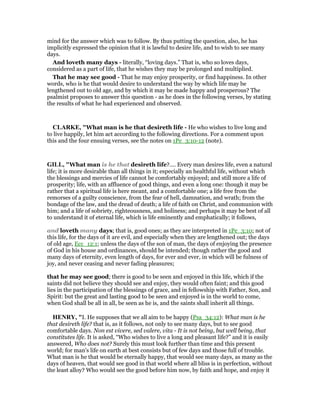
![shortly? Who would? Alas! very few have that in their thoughts. Most ask, Who will
show us any good? But few ask, What shall we do to inherit eternal life? This question
implies that there are some such.
JAMISO , "What man — Whoever desires the blessings of piety, let him attend.
CALVI , "12.Who is the man who desireth life? The prophet does not inquire if
there be any man so disposed, as if all men voluntarily brought upon themselves the
miseries which befall them; for we know that all men without exception desire to
live in the enjoyment of happiness. But he censures severely the blindness and folly
which men exhibit in the frowardness of their desires, and the vanity of their
endeavors to obtain happiness; for while all men are seeking, and eagerly intent
upon acquiring what is for their profit, there will be found scarcely one in a
hundred who studies to purchase peace, and a quiet and desirable state of life, by
just and equitable means. The prophet therefore admonishes his disciples, that
nearly the whole world are deceived and led astray by their own folly, while they
promise themselves a happy life from any other source than the divine blessing,
which God bestows only upon the sincere and upright in heart. But there is in this
exclamation still greater vehemence, the more effectually to awaken dull and drowsy
minds to the course of this world; as if he had said, Since all men earnestly desire
happiness, how comes it to pass, that scarcely any one sets himself to obtain it, and
that every man, by his own fault, rather brings upon himself various troubles?
SPURGEO , "Ver. 12. Life spent in happiness is the desire of all, and he who can
give the young a receipt for leading a happy life deserves to be popular among them.
Mere existence is not life; the art of living, truly, really, and joyfully living, it is not
given to all men to know. To teach men how to live and how to die, is the aim of all
useful religious instruction. The rewards of virtue are the baits with which the
young are to be drawn to morality. While we teach piety to God we should also
dwell much upon morality towards man.
EXPLA ATORY OTES A D QUAI T SAYI GS
Ver. 12. It is no great matter to live long, or always, but to live happily. That loyal
prayer, "Let the king live" (in every language) imports a prosperous state. When
the psalmist saith, "Who is the man that would see life?" he explains himself
presently after by "good days." Vivere among the Latins is sometimes as much as
valere, to live is as much as to be well; and upon this account it is that, on the one
hand, the Scripture calls the state of the damned an eternal death, because their life
is only a continuance in misery; so on the other hand the state of the blessed is an
eternal life, because it is a perpetual abode in felicity. athanael Hardy.
Ver. 12. The benefit of life is not in the length, but in the use of it. He sometimes
lives the least that lives the longest. Seneca.
TRAPP, "Psalms 34:12 What man [is he that] desireth life, [and] loveth [many]
days, that he may see good?
Ver. 12. What man is he that desireth life?] This is David’s doctrine; and to draw](https://image.slidesharecdn.com/psalm34commentary-160516140540/85/Psalm-34-commentary-90-320.jpg)
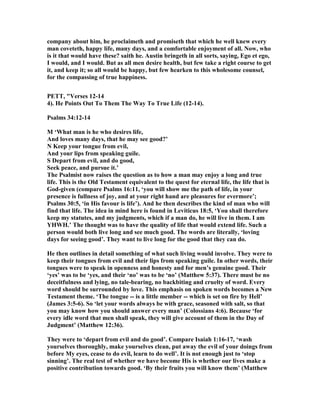
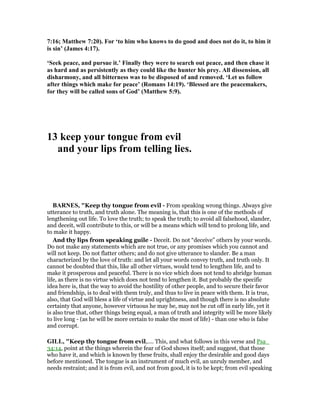
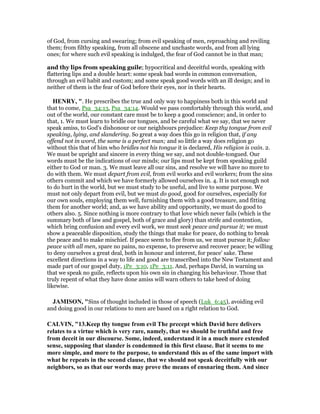
![nothing is more difficult than to regulate our discourse in such a manner as that our
speech may be a true representation of our hearts, David calls upon us to exercise
over it a strict and watchful control, not suffering it to run riot, lest it should prove
the occasion of our deceiving others.
SPURGEO "Ver. 13. Keep thy tongue from evil. Guard with careful diligence that
dangerous member, the tongue, lest it utter evil, for that evil will recoil upon thee,
and mar the enjoyment of thy life. Men cannot spit forth poison without feeling
some of the venom burning their own flesh. And thy lips from speaking guile. Deceit
must be very earnestly avoided by the man who desires happiness. A crafty schemer
lives like a spy in the enemy's camp, in constant fear of exposure and execution.
Clean and honest conversation, by keeping the conscience at ease, promotes
happiness, but lying and wicked talk stuffs our pillow with thorns, and makes life a
constant whirl of fear and shame. David had tried the tortuous policy, but he here
denounces it, and begs others as they would live long and well to avoid with care the
doubtful devices of guile.
TRAPP, "Psalms 34:13 Keep thy tongue from evil, and thy lips from speaking guile.
Ver. 13. Keep thy tongue from evil, &c.] This is a hard saying, think the most; who
will therefore rather venture it than yield to be so tied up. The tongue is an unruly
member, and can hardly be hampered. But who would not temper his tongue, and
bind it to the good abearance, for true blessedness? Who would not rather bite it off,
and spit it out (as that ancient martyr did his, into the face of the tyrant, who
solicited him to deny Christ), than miss heaven? Ficinus after his tract De sanitate
tuenda, of keeping good health; and another, of recovering health; and a third, of
prolonging life; because all will not do, wisely addeth a fourth, of laying hold on
eternal life; which cannot be done but by mortifying this earthly member, a loose
and lewd tongue. For by thy words thou shalt be justified, and by thy words thou
shalt be condemned, saith the Judge himself, Matthew 12:37 : compare Genesis
49:21, with Deuteronomy 33:23, and it will appear that good words ingratiate with
God and men.
14 Turn from evil and do good;
seek peace and pursue it.](https://image.slidesharecdn.com/psalm34commentary-160516140540/85/Psalm-34-commentary-94-320.jpg)
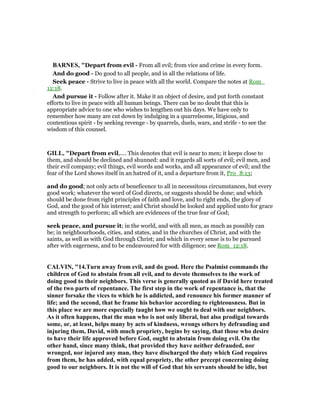
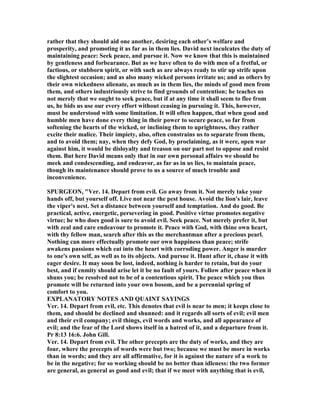
![our part is to depart, for there is no demurring upon evil. Sir Richard Baker.
Ver. 14. Do good. egative goodness is not sufficient to entitle us to heaven. There
are some in the world whose religion runs all upon negatives; they are not
drunkards, they are not swearers, and for this they do bless themselves. See how the
Pharisee vapours Lu 18:11, "God, I thank thee that I am not as other men are,
extortioners, unjust, adulterers, "etc. Alas! the not being scandalous will no more
make a Christian than a cypher will make a sum. We are bid, not only to cease from
evil, but to do good. It will be a poor plea at last--Lord, I kept myself from being
spotted with gross sin: I did no hurt. But what good is there in thee? It is not enough
for the servant of the vineyard that he doth no hurt there, he doth not break the
trees, or destroy the hedges; if he doth not work in the vineyard he loseth his pay. It
is not enough for us to say at the last day, we have done no hurt, we have lived in no
gross sin; but what good have we done in the vineyard? Where is the grace we have
gotten? If we cannot show this, we shall lose our pay, and miss of salvation. Thomas
Watson.
Ver. 14. Seek peace, and pursue it. Yea, do well, and thou shalt not need to pursue
it; peace will find thee without seeking. Augustine says, Fiat justitia, et habebis
pacem --Live righteously, and live peaceably. Quietness shall find out righteousness
wheresoever he lodgeth. But she abhorreth the house of evil. Peace will not dine
where grace hath not first broken her fast. Let us embrace godliness, and "the peace
of God, that passeth all understanding, shall preserve our hearts and minds in Jesus
Christ." Philippians 4:7. Thomas Adams.
Ver. 14. See peace and pursue it. The most desirable things are not the easiest to be
obtained. What is more lovely to the imagination than the tranquillity of peace? But
this great blessing does not voluntarily present itself: it must be sought. Even when
sought it often eludes the grasp: it flies away, and must be pursued. 1. The man of a
peaceable carriage must be cautious not to give offence when needless, or, when it
may innocently be spared.
2. Another part of the peaceable man's character is, not to take offence; especially in
small matters, which are hardly worth a wise man's notice. 3. If any needless offence
has been either given or taken, we must endeavour to put a stop to it as soon as may
be. If a difference is already begun, stifle it in the birth, and suffer it not to proceed
farther. Condensed from Dr. Waterland's Sermon, in J. R. Pitman's Course of
Sermons on the Psalms, 1846.
TRAPP, "Psalms 34:14 Depart from evil, and do good; seek peace, and pursue it.
Ver. 14. Depart from evil, and do good] For negative goodness helpeth not. A man
must so abstain from evil as that he do good, or he doth nothing. It is said of
Ithacius, that the hatred of the Priscillian heresy was the best that could be said of
him; this was but a slender commendation.
Seek peace and pursue it] As hunters do the prey. If it fly from thee, make after it; it
will pay thee for thy pains. It is said of Frederick III, emperor, that he putting up
many injuries, he reigned quietly fifty and three years and five months. He had need
be patient that would be at peace. Ut habeas quietum tempus, perde aliquid, was a](https://image.slidesharecdn.com/psalm34commentary-160516140540/85/Psalm-34-commentary-97-320.jpg)
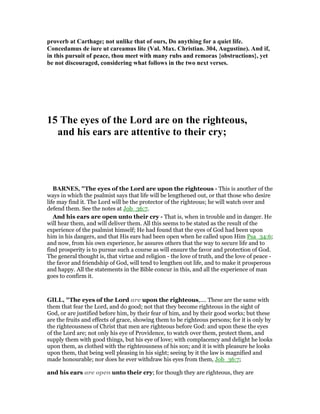
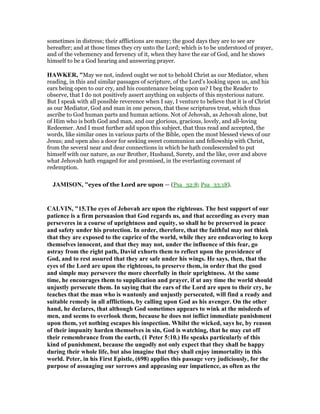
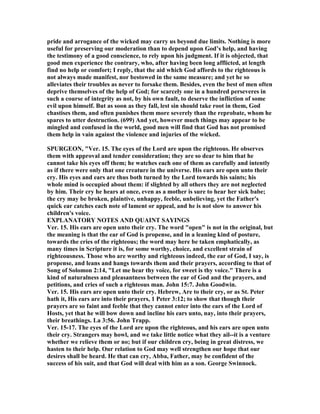
![COKE, "Psalms 34:15. The eyes of the Lord are upon the righteous— i.e. He
beholds them with approbation, and is constantly watchful over them to protect and
supply them; and, on the other hand, the face of the Lord is against them that do
evil, as he views them with displeasure, and marks them out for vengeance. Mr.
Mudge reads the 16th verse in a parenthesis, as coming in only by the bye; for the
general subject relates to good men, and the 17th verse is connected to the 15th. His
eyes are open to their cry;—They cry, &c..
TRAPP, "Psalms 34:15 The eyes of the LORD [are] upon the righteous, and his ears
[are open] unto their cry.
Ver. 15. The eyes of the Lord are upon the righteous] He seeth and weigheth the
wrongs they sustain for peace sake, and they shall be no losers thereby; provided
that their pursuit of peace proceed from the filial fear of God, which David here
professeth to teach, Psalms 34:11. God’s eyes are intent, his ears attent, to these
righteous ones. Palam, clam (as Aben Ezra here), openly, secretly, he wilt right them
and recompense them. Should not God see, as well as hear, saith another, his
children should want many things. We apprehend not all our own wants, and so
cannot pray for relief of all. He (of his own accord without any monitor) is wont to
aid us.
And his ears are open to their cry] Heb. are to their cry. Or, as St Peter hath it, His
ears are into their prayers; to show, that though their prayers are so faint and feeble
that they cannot enter into the ears of the Lord of hosts, yet that he will bow down
and incline his ears unto, nay, into their prayers, their breathings, Lamentations
3:56.
COFFMA , ""The eyes of Jehovah are toward the righteous,
And his ears are open unto their cry.
The face of Jehovah is against them that do evil,
To cut off the remembrance of them from the earth.
The righteous cried, and Jehovah heard,
And delivered them out of all their troubles. Jehovah is nigh unto them that are of a
broken heart,
And saveth such as are of a contrite spirit.
Many are the afflictions of the righteous;](https://image.slidesharecdn.com/psalm34commentary-160516140540/85/Psalm-34-commentary-101-320.jpg)
![But Jehovah delivereth him out of them all."
The principal burden of these verses is to provide motivation and encouragement
for the young people David was teaching to fear the Lord.
"The face of Jehovah is against them that do evil" (Psalms 34:16). "All men sin, but
the reference here is to those who will not repent and who have no intention of
turning away from their evil deeds. God will not even hear them when they pray
(John 9:31)."[16]
" igh unto them ... of a broken heart" (Psalms 34:18). Our Lord himself was a man
of sorrows and acquainted with grief; and he is the ever ready comforter and
Saviour of those whose hearts have been broken by the soul's tragic encounter with
the wicked world in which we live.
"God saveth such as are of a contrite spirit" (Psalms 34:18). Again the marvelous
words of Kipling come to mind:
"The tumult and the shouting dies;
The Captains and the Kings depart.
Still stands Thine ancient sacrifice,
An humble and a contrite heart.
Lord God of Hosts, be with us yet,
Lest we forget; lest we forget!"
- Rudyard Kipling (The Recessional)SIZE>
"Many are the afflictions of the righteous" (Psalms 34:19). The Bible is loaded with
admonitions that echo these words. "We must through much tribulation enter into
the kingdom of God." "They that live godly in Christ Jesus shall suffer
persecution." "Wickedness shall wax worse and worse." Alas, "We must, like the
Captain of our Salvation, be made perfect through suffering (Hebrews 2:10)."[17]
Seeing, therefore, that the righteous are destined to suffer during the years of our
probation, we should strive to remember that the Lord himself was "made perfect"
by it; and that he suffered "for us." Moreover, we should never forget that:
"Our light affliction, which is for the moment, worketh for us more and more
exceedingly an eternal weight of glory!" (2 Corinthians 4:17).
This verse says that our sufferings are "working for us." May we have the grace to
believe it!
PETT, "Verses 15-20](https://image.slidesharecdn.com/psalm34commentary-160516140540/85/Psalm-34-commentary-102-320.jpg)
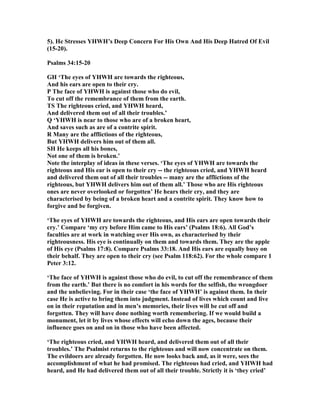
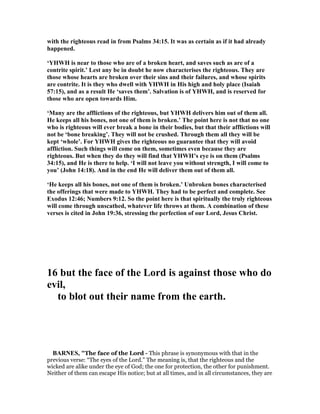
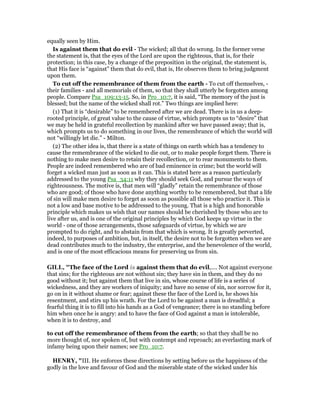
![displeasure. Here are life and death, good and evil, the blessing and the curse, plainly
stated before us, that we may choose life and live. See Isa_3:10, Isa_3:11.
1. Woe to the wicked, it shall be ill with them, however they may bless themselves in
their own way. (1.) God is against them, and then they cannot but be miserable. Sad is
the case of that man who by his sin has made his Maker his enemy, his destroyer. The
face of the Lord is against those that do evil, Psa_34:16. Sometimes God is said to turn
his face from them (Jer_18:17), because they have forsaken him; here he is said to set his
face against them, because they have fought against him; and most certainly God is able
to out-face the most proud and daring sinners and can frown them into hell. (2.) Ruin is
before them; this will follow of course if God be against them, for he is able both to kill
and to cast into hell. [1.] The land of the living shall be no place for them nor theirs.
When God sets his face against them he will not only cut them off, but cut off the
remembrance of them; when they are alive he will bury them in obscurity, when they are
dead he will bury them in oblivion. He will root out their posterity, by whom they would
be remembered. He will pour disgrace upon their achievements, which they gloried in
and for which they thought they should be remembered. It is certain that there is no
lasting honour but that which comes from God. [2.] There shall be a sting in their death:
Evil shall slay the wicked, Psa_34:21. Their death shall be miserable; and so it will
certainly be, though they die on a bed of down or on the bed of honour. Death, to them,
has a curse in it, and is the king of terrors; to them it is evil, only evil. It is very well
observed by Dr. Hammond that the evil here, which slays the wicked, is the same word,
in the singular number, that is used (Psa_34:19) for the afflictions of the righteous, to
intimate that godly people have many troubles, and yet they do them no hurt, but are
made to work for good to them, for God will deliver them out of them all; whereas
wicked people have fewer troubles, fewer evils befal them, perhaps but one, and yet that
one may prove their utter ruin. One trouble with a curse in it kills and slays, and does
execution; but many, with a blessing in them, are harmless, nay, gainful. [3.] Desolation
will be their everlasting portion. Those that are wicked themselves often hate the
righteous, name and thing, have an implacable enmity to them and their righteousness;
but they shall be desolate, shall be condemned as guilty, and laid waste for ever, shall be
for ever forsaken and abandoned of God and all good angels and men; and those that are
so are desolate indeed.
JAMISO , "face ... against — opposed to them (Lev_17:10; Lev_20:3).
cut off the remembrance — utterly destroy (Psa_109:13).
K&D 16-21, "(Heb.: 34:17-22) The poet now recommends the fear of God, to which
he has given a brief direction, by setting forth its reward in contrast with the punishment
of the ungodly. The prepositions ל ֶא and ְ , in Psa_34:16 and Psa_34:17, are a well
considered interchange of expression: the former, of gracious inclination (Psa_33:18),
the latter, of hostile intention or determining, as in Job_7:8; Jer_21:10; Jer_44:11, after
the phrase in Lev_17:10. The evil doers are overwhelmed by the power of destruction
that proceeds from the countenance of Jahve, which is opposed to them, until there is
not the slightest trace of their earthly existence left. The subjects to Psa_34:18 are not,
according to Psa_107:17-19, the ע ָר י ֵּשׁע (evil doers), since the indispensable characteristic
of penitence is in this instance wanting, but the צדיקים (the righteous). Probably the פ
strophe stood originally before the ע strophe, just as in Lam 2-4 the פ precedes the ע
(Hitzig). In connection with the present sequence of the thoughts, the structure of Psa_](https://image.slidesharecdn.com/psalm34commentary-160516140540/85/Psalm-34-commentary-106-320.jpg)
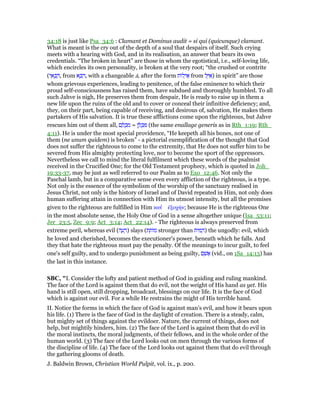
![SPURGEO , "Ver. 16. The face of the Lord is against them that do evil. God is not
indifferent to the deeds of sinners, but he sets his face against them, as we say, being
determined that they shall have no countenance and support, but shall be thwarted
and defeated. He is determinately resolved that the ungodly shall not prosper; he
sets himself with all his might to overthrow them. To cut off the remembrance of
them from the earth. He will stamp out their fires, their honour shall be turned into
shame, their names forgotten or accursed. Utter destruction shall be the lot of all the
ungodly.
TRAPP, "Psalms 34:16 The face of the LORD [is] against them that do evil, to cut
off the remembrance of them from the earth.
Ver. 16. The face of the Lord is against them that do evil] Let not such dream of a
long and happy life, as Psalms 34:12. This they are apt to do; but shall be carried
from a fool’s paradise to a true prison. For that people may not imagine God to be
µονοφθαλµαν, and so made up of mercy as to forget his judgments, the wicked are
here assured, that the face of the Lord is against them, that he beholdeth them from
heaven with a terrible countenance, that he is grievously angry with them, and will
surely and severely punish them, and theirs after them.
To cut off the remembrance of them from the earth] And so to cross them in the
thing that they most coveted, viz. to renown themselves among men. God writeth
them in the earth in opposition to those whose names are written in heaven, Luke
10:20, because they forsook the Lord, the fountain of living waters, Jeremiah 17:13.
17 The righteous cry out, and the Lord hears
them;
he delivers them from all their troubles.](https://image.slidesharecdn.com/psalm34commentary-160516140540/85/Psalm-34-commentary-108-320.jpg)
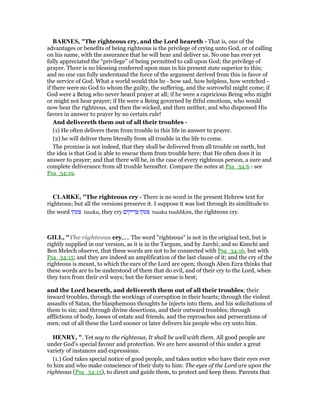
![are very fond of a child will not let it be out of their sight; none of God's children are ever
from under his eye, but on them he looks with a singular complacency, as well as with a
watchful and tender concern.
(2.) They are sure of an answer of peace to their prayers. All God's people are a praying
people, and they cry in prayer, which denotes great importunity; but is it to any
purpose? Yes, [1.] God takes notice of what we say (Psa_34:17): They cry, and the Lord
hears them, and hears them so as to make it appear he has a regard to them. His ears
are open to their prayers, to receive them all, and to receive them readily and with
delight. Though he has been a God hearing prayer ever since men began to call upon the
name of the Lord, yet his ear is not heavy. There is no rhetoric, nothing charming, in a
cry, yet God's ears are open to it, as the tender mother's to the cry of her sucking child,
which another would take no notice of: The righteous cry, and the Lord heareth, Psa_
34:17. This intimates that it is the constant practice of good people, when they are in
distress, to cry unto God, and it is their constant comfort that God hears them. [2.] He
not only takes notice of what we say, but is ready for us to our relief (Psa_34:18): He is
nigh to those that are of a broken heart, and saves them. Note, First, It is the character
of the righteous, whose prayers God will hear, that they are of a broken heart and a
contrite spirit (that is, humbled for sin and emptied of self); they are low in their own
eyes, and have no confidence in their own merit and sufficiency, but in God only.
Secondly, Those who are so have God nigh unto them, to comfort and support them,
that the spirit may not be broken more than is meet, lest it should fail before him. See
Isa_57:15. Though God is high, and dwells on high, yet he is near to those who, being of
a contrite spirit, know how to value his favour, and will save them from sinking under
their burdens; he is near them to good purpose.
JAMISO , "Humble penitents are objects of God’s special tender regard (Psa_51:19;
Isa_57:15).
CALVI , "17.They (700) cried, and Jehovah heard them. The Psalmist’s meaning
is, that they are heard as often as they cry. This is a doctrine applicable to all times;
and David does not merely relate what God has done once or twice, but what he is
accustomed to do. It is also a confirmation of the preceding sentence, where he had
said that the ears of the Lord are open to the cry of the righteous; for he now
demonstrates by the effect, that God is not deaf when we lay our complaints and
groanings before him. By the word cry we are taught, that although God defend the
righteous, they are not exempt from adversity. He regulates the protection which he
affords them in such a wonderful manner, as that he notwithstanding exercises them
by various trials. In like manner, when we here see that deliverance is promised only
to those who call upon God, this ought to prove no small encouragement to us to
pray to him; for it is not his will that the godly should so regard his providence as to
indulge in idleness, but rather that, being firmly persuaded that he is the guardian
of their safety, they should direct their prayers and supplications to him.
SPURGEO , "Ver. 17. The righteous cry. Like Israel in Egypt, they cry out under
the heavy yoke of oppression, both of sin, temptation, care, and grief. And the Lord
heareth; he is like the night watchman, who no sooner hears the alarm bell than he
flies to relieve those who need him. And delivereth them out of all their troubles. o](https://image.slidesharecdn.com/psalm34commentary-160516140540/85/Psalm-34-commentary-110-320.jpg)
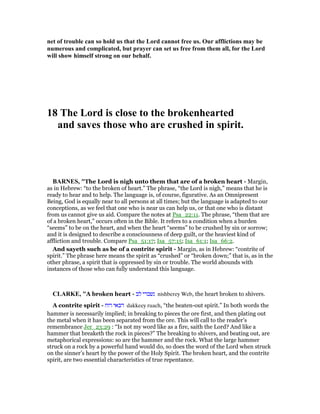
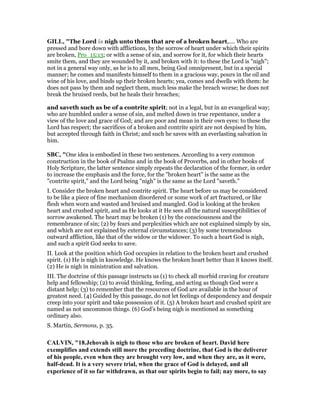
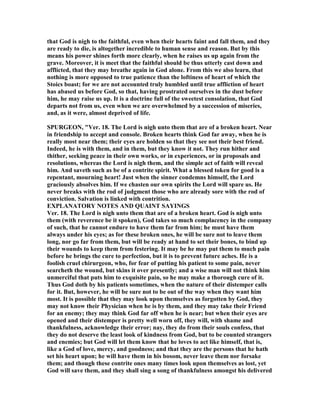
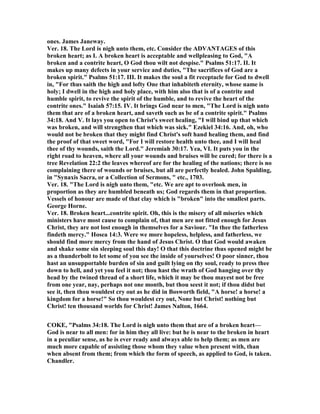
![TRAPP, "Psalms 34:18 The LORD [is] nigh unto them that are of a broken heart;
and saveth such as be of a contrite spirit.
Ver. 18. The Lord is nigh unto them, &c.] More nigh than the bark is to the tree, for
he is with them and in them continually; pouring the oil of his grace into these
broken vessels, quorum corda peccata eorum non amplius retinent, sed, ut vas
fracture, effundunt, saith Aben Ezra here, whose hearts retain not their sins any
longer, but pour them out as water before the Lord.
And saveth such as be of a contrite spirit] Such as are ground to powder, as it were,
with sense of sin and fear of wrath; yet not without good hope of mercy. These God
delivereth out of their dangers; and in fine bringeth them to eternal blessedness.
SIMEO , "THE BROKE A D CO TRITE I HEART E COURAGED
Psalms 34:18. The Lord is nigh unto them that are of a broken heart; and saveth
such as be of a contrite spirit.
THE objects of God’s favour are very frequently designated by the exalted title of
“The righteous:” “The eyes of the Lord are upon the righteous:” “Many are the
afflictions of the righteous:” “They that hate the righteous shall be desolate [ ote:
ver. 34:19, 21.].” But, a person of an humble spirit finds it difficult to assume to
himself this character, because of the innumerable imperfections of which he is
conscious; and, consequently, he is backward to claim the promises assigned to it.
But the terms whereby the Lord’s people are characterized in our text are such as
the most humble may appropriate to themselves without vanity: and whatever is
promised to them under that character, they may regard as their legitimate and
assured portion.
The words before us will naturally lead me to shew,
I. What is that spirit which the Lord approves—
There is a brokenness of heart which God does not approve, because it proceeds
altogether from worldly sorrow [ ote: Proverbs 15:13.]: but that which is associated
with contrition is truly pleasing in his sight.
Let us more distinctly see what the spirit here designated is—
[It is called “a broken heart, and a contrite spirit.” It is founded altogether in a
sense of sin, and in a consciousness of deserving God’s wrath on account of sin. It is,
however, no light sense of sin, but such an one as David had, when he said, “Mine
iniquities are gone over my head: as a heavy burthen, they are too heavy for me
[ ote: Psalms 38:4.]:” “Mine iniquities have taken such hold upon me, that I am not
able to look up: they are more than the hairs of my head; therefore my heart faileth](https://image.slidesharecdn.com/psalm34commentary-160516140540/85/Psalm-34-commentary-115-320.jpg)
![me [ ote: Psalms 40:12.].” or is it merely on account of the penalty annexed to
transgression that they are so oppressed, but on account of its hateful nature, as
defiling and debasing their souls. Hence they “lothe themselves,” as vile, and base,
and filthy, and abominable [ ote: Ezekiel 36:31.]: yea, to their dying hour do they
retain this humiliating sense of their own corruptions, notwithstanding they have a
hope that God is pacified towards them; and even the more on account of that very
mercy which they have experienced at his hands [ ote: Ezekiel 16:63.].
Shall it be thought that such a sense of sin can become those only who have been
guilty of some flagrant enormities? I answer, It befits the most moral person upon
earth, no less than the most abandoned sinner. I say not that the moral and the
immoral are upon a perfect level, either in the sight of God or man; for, beyond all
doubt, all are hateful in proportion to the greatness and multitude of their
iniquities: but there is no person so virtuous, but that he needs to be humbled before
God in dust and ashes. Let any man, however virtuous, look back upon his past life,
and see how far he has been from God, and how entirely he has lived to himself. Let
him consider how little sense he has had of his obligations to God, especially for all
the wonders of redeeming love — — — and how often he has “done despite to the
Holy Spirit,” in resisting his sacred motions, and in deferring that great work which
he knew to be necessary for the salvation of his soul. We quite mistake, if we think
that guilt attaches only to flagrant immoralities: the living without God in the world
is the summit and consummation of all guilt: and where is the man who must not
plead guilty to that charge? I suppose that no one will be found to arrogate to
himself a higher character than that of Job, who, according to the testimony of God
himself, was “a perfect and upright man:” yet did even Job, when led into just views
of himself, exclaim, “Behold, I am vile!” “I repent therefore, and abhor myself in
dust and ashes [ ote: Job 40:4; Job 42:6.].”]
This is the spirit which God approves—
[This, how unamiable soever it may appear in the eyes of men, is most pleasing in
the sight of God. And well it may be so: for it honours God’s Law. The man who is
not thus abased before God, declares, in effect, that there is no great evil in
disregarding God’s Law, and that there is no occasion for those who have
transgressed it to be ashamed. But the truly contrite person who lothes himself for
his iniquities, acknowledges that “the Law is holy, and just, and good,” and that
every transgression of it is a just ground for the deepest humiliation.
Moreover, the contrition here spoken of justifies God’s denunciations against sin.
The unhumbled sinner says, in effect, God will not execute judgment: nor have I
any cause to tremble for his displeasure: and if he were to consign me over to
perdition on account of my sins, he would be unmerciful and unjust. On the
contrary, the man whose heart is broken bears a very different testimony. He
acknowledges that he deserves God’s wrath and indignation; and that, whatever
sentence the Judge shall pass upon him, he will be fully justified as not inflicting
more than his iniquities have deserved [ ote: Psalms 51:4.].](https://image.slidesharecdn.com/psalm34commentary-160516140540/85/Psalm-34-commentary-116-320.jpg)
![Above all, the contrite person manifests a state of mind duly prepared for the
reception of the Gospel. “What shall I do to be saved [ ote: Acts 16:30.]?” is his cry
from day to day: and, when he finds that the Gospel makes known to him a Saviour,
O! how gladly does he embrace the proffered mercy! how thankfully does he
renounce all hope in himself, and put on him the unspotted robe of Christ’s
righteousness! The unhumbled sinner can hear the glad tidings of salvation without
feeling any deep interest in them: but the truly contrite person regards the Saviour,
as the man who had accidentally slain a neighbour regarded the city of refuge: he
knows that in Christ alone he can find safety; and he has no rest in his soul till he
has fled for refuge to the hope set before him.
Thus, whilst the person that is “whole feels no need of the physician, the sick” and
dying patient commits himself entirely to his care, and thankfully follows the
regimen he prescribes. Well, therefore, may God approve of him, since he, and he
alone, appreciates aright the gift of God’s only dear Son to be the Saviour of the
world.]
But it will be proper to inquire,
II. In what way he will testify his approbation of it—
A person bowed down with a sense of sin is ready to fear that God will never shew
mercy to one so undeserving of it. But God promises, in our text, that,
1. “He will be nigh unto them that are of a broken heart”—
[God, being everywhere present, may be supposed to be as near to one person as
another. And so he is, if we regard his essence. But there are manifestations of the
Divine presence, which the world at large have no conception of, but which are
experienced by all who follow after God in the exercise of prayer and faith. The
Apostle spoke not in his own person only, but in the person of believers generally,
when he said, “Truly our fellowship is with the Father, and with his Son Jesus
Christ.” We are taught to expect, that if we “draw nigh to God, he will draw nigh to
us:” he will “lift up the light of his countenance upon us:” he will “shed abroad his
love in our hearts:” he will enable us to cry with holy confidence, “Abba, Father;”
and will “witness with our spirits that we are his.”
Is any one disposed to ask, “How can these things be?” “How u it that God will
manifest himself to his people, and not unto the world?” This is the very question
which one of the Apostles put to our Lord; who, in reply, confirmed the truth he
had asserted; saying, “If any man love me, ho will keep my words: and my Father
will love him; and we will come unto him, and make our abode with him [ ote:
John 14:21-23.].”]
2. “He will save those that be of a contrite spirit”—
[Many are their fears in relation to their final happiness: but “God will never suffer](https://image.slidesharecdn.com/psalm34commentary-160516140540/85/Psalm-34-commentary-117-320.jpg)
![so much as one of his little ones to perish.” The contrite in particular he will save:
for “he looketh upon men; and if any say, I have sinned, and perverted that which
was right, and it profited me not; he will deliver his soul from going into the pit, and
his life shall see the light [ ote: Job 33:24; Job 33:27-28.].” Their temptations
maybe many; but “He will not suffer them to be tempted above that they are able;
but will with the temptation make also for them a way to escape, that they may be
able to bear it [ ote: 1 Corinthians 10:13.].” However numerous or potent their
enemies may be, “he will deliver them out of the hands of all [ ote: Luke 1:74.],”
and “make them more than conquerors over all [ ote: Romans 8:37.].” In a word,
“He will save them with an everlasting salvation; nor shall they be ashamed or
confounded world without end [ ote: Isaiah 45:17.].”]
But the text leads me rather to shew you,
III. What present encouragement the very existence of it affords to those in
whom it is found—
The contrition which has been before described is the fruit and effect of God’s love
to the soul—
[“The Lord is nigh unto them that are of a broken heart, and saveth such as be of a
contrite spirit.” There is no work of divine grace more difficult than this. The taking
away of the stony heart, and the giving a heart of flesh, is a new creation; and
discovers as clearly the operation of Omnipotence as the universe itself. It is the very
beginning of salvation in the soul. A person under a deep sense of sin is apt to
imagine that God will not have mercy upon him: but his very contrition is a proof
and evidence that God has already imparted to him his grace. What a reviving
consideration is this to the humble penitent! God is nigh thee: he is in the very act of
saving thee. Why, then, art thou cast down? Why art thou “saying, The Lord hath
forsaken and forgotten me?” Does the greatness of thy guilt appal thee? Who
shewed to thee thy sins? Who opened thine eyes? Who softened thy heart? Who
disposed thee to condemn thyself, and to justify thy God? Is this thine own work, or
the work of any enemy? Does not the very nature of the work itself constrain thee to
say, “He that hath wrought me to this self-same thing, is God?”]
It is also the earnest and foretaste of your eternal inheritance—
[Would God have done such things for thee, if he had designed ultimately to destroy
thee [ ote: Judges 13:23.]? These are only as the first-fruits, which sanctified and
assured the whole harvest. He has expressly told us, that the gift of his “Spirit is an
earnest of our inheritance, until the redemption of the purchased possession [ ote:
Ephesians 1:13-14. See the whole of these assertions confirmed, Psalms 91:14-16;
Psalms 145:18-19.].” You are aware what an earnest is: it is not only a pledge of
future blessings, but the actual commencement of them in the soul. And, if you will
survey the heavenly hosts, you will find that this very abasement of their souls
before God is a striking feature in their character, and a grand constituent of their
bliss. They all, with lowliest self-abasement, fall on their faces before the throne of](https://image.slidesharecdn.com/psalm34commentary-160516140540/85/Psalm-34-commentary-118-320.jpg)
![God, whilst, with devoutest acclamations, they ascribe salvation to God and to the
Lamb [ ote: Revelation 5:8-10.]. Learn, then, to view all your feelings in their
proper light; so shall you “from the eater bring forth meat, and from the strong
shall bring forth sweet.”]
Let me not, however, conclude without addressing a few words,
1. To those in whom this spirit is not found—
[You, alas! have no part or lot in the blessedness which is prepared for the broken in
heart. Look at the Pharisee and the Publican: the one was filled with self-
complacency, on account of his own fancied goodness; whilst the other dared not
even to lift up his eyes to heaven, on account of his own conscious unworthiness. But
it was the latter, and not the former, who found acceptance with God: and in all
similar characters shall the same event be realized, as long as the world shall stand.
Humble yourselves, therefore, whoever ye be; for in that way only have ye any hope
that God shall lift you up [ ote: James 4:7-8.].]
2. To those who are dejected by reason of it—
[Forget not, I beseech you, for what end the Lord Jesus Christ came into the world:
Was it not to bind up the broken heart; and to give to those who “mourn in Zion, to
give,” I say, “beauty for ashes, the oil of joy for mourning, and the garment of praise
for the spirit of heaviness [ ote: Isaiah 61:1-3 and Luke 4:18.]?” And, if the
greatness of your past sins appear an obstacle in your way, has he not told you, that
“where sin has abounded, his grace shall much more abound [ ote: Romans 5:20-
21.]?” Yield not, then, to desponding thoughts, nor limit the mercy of your God: but
know assuredly, that he will “heal the broken in heart [ ote: Psalms 147:3.],” and
that all who come unto the Saviour heavy-laden with their sins shall be partakers of
his promised rest [ ote: Matthew 11:28.].]
19 The righteous person may have many troubles,
but the Lord delivers him from them all;](https://image.slidesharecdn.com/psalm34commentary-160516140540/85/Psalm-34-commentary-119-320.jpg)
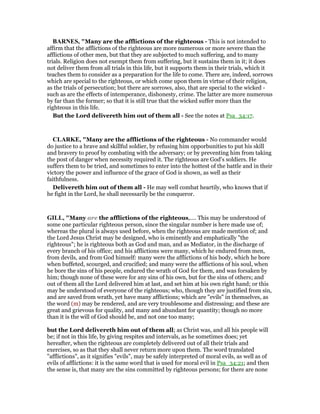
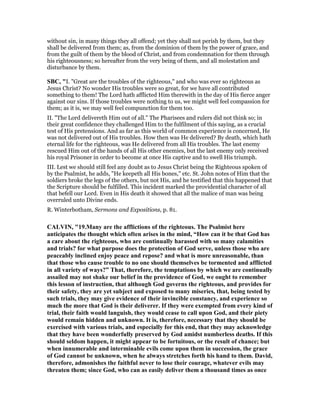
![from death, will never disappoint their expectation. What he adds concerning their
bones, seems not a little to illustrate the truth of this doctrine, and to teach us that
those who are protected by God shall be free from all danger. He therefore declares,
that God will take care that not one of their bones shall be broken; in which sense
Christ also says, that
“the very hairs of our head are all numbered,” (Luke 12:7.)
SPURGEO , "Ver. 19. Many are the afflictions of the righteous. Thus are they
made like Jesus their covenant Head. Scripture does not flatter us like the story
books with the idea that goodness will secure us from trouble; on the contrary, we
are again and again warned to expect tribulation while we are in this body. Our
afflictions come from all points of the compass, and are as many and as tormenting
as the mosquitoes of the tropics. It is the earthly portion of the elect to find thorns
and briars growing in their pathway, yea, to lie down among them, finding their rest
broken and disturbed by sorrow. BUT, blessed but, how it takes the sting out of the
previous sentence! But the Lord delivereth him out of them all. Through troops of
ills Jehovah shall lead his redeemed scatheless and triumphant. There is an end to
the believer's affliction, and a joyful end too. one of his trials can hurt so much as
a hair of his head, neither can the furnace hold him for a moment after the Lord
bids him come forth of it. Hard would be the lot of the righteous if this promise, like
a bundle of camphire, were not bound up in it, but this sweetens all. The same Lord
who sends the afflictions will also recall them when his design is accomplished, but
he will never allow the fiercest of them to rend and devour his beloved.
EXPLA ATORY OTES A D QUAI T SAYI GS
Ver. 19. Many are the afflictions of the righteous, etc. Be our troubles many in
number, strange in nature, heavy in measure; yet God's mercies are more
numerous, his wisdom more wondrous, his power more miraculous; he will deliver
us out of all. Thomas Adams.
Ver. 19. Many are the afflictions of the righteous, etc. When David did behold his
trouble, like the host of the Aramites 2 Kings 6:16, he looked back unto God like
Elisha, and spied one with him stronger than all against him. Therefore, respecting
his afflictions he crieth, Many are the troubles of the righteous; respecting the
promise he says, The Lord delivereth him out of all. Thus, by his own foot, David
measures the condition of the righteous, and saith, Many are the troubles of the
righteous; and then, by his own cure, he showeth how they should be healed, saying,
The Lord will deliver him out of them all. ...The lawyer can deliver his client but
from strife, the physician can deliver his patient but from sickness, the master can
deliver his servant but from bondage, but the Lord delivereth us from all. As when
Moses came to deliver the Israelites, he would not leave a hoof behind him, so when
the Lord cometh to deliver the righteous he will not leave a trouble behind him. He
who saith, "I put away all thine iniquities, " will also say, "I put away all thine
infirmities." Henry Smith.
TRAPP, "Psalms 34:19 Many [are] the afflictions of the righteous: but the LORD
delivereth him out of them all.](https://image.slidesharecdn.com/psalm34commentary-160516140540/85/Psalm-34-commentary-122-320.jpg)
![Ver. 19. Many are the troubles, &c.] Dei sunt nuntii, these are God’s messengers,
saith Kimchi, and they seldom come single. See James 1:2. {See Trapp on "James
1:2"} Sent they are also to the wicked, Psalms 32:10, but on another errand, and for
another end. The righteous, per augusta ad augustum, per spinas ad rosas, per
motum ad quietem, per procellas ad portum, per crucem ad caelum contendunt,
through many tribulations they enter into God’s kingdom. ot so the wicked; their
crosses are but a typical hell.
But the Lord delivereth him out of them all] o country hath more venomous
creatures, none more antidotes, than Egypt; so godliness hath many troubles, and as
many helps against trouble.
20 he protects all his bones,
not one of them will be broken.
BAR ES, "He keepeth all his bones - That is, he preserves or guards the
righteous.
Not one of them is broken - Perhaps there is a direct and immediate allusion here
to what the psalmist had himself experienced. In His dangers God had preserved him, so
that he had escaped without a broken bone. But the statement is more general, and is
designed to convey a truth in respect to the usual and proper effect of religion, or to
denote the advantage, in reference to personal safety in the dangers of this life, derived
from religion. The language is of a general character, such as often occurs in the
Scriptures, and it should, in all fairness, be so construed. It cannot mean that the bones
of a righteous man are never broken, or that the fact that a man has a broken bone
proves that he is not righteous; but it means that, as a general principle, religion
conduces to safety, or that the righteous are under the protection of God. Compare Mat_
10:30-31. Nothing more can be demanded in the fair interpretation of the language than
this.
CLARKE, "He keepeth all his bones - He takes care of his life; and if he have
scars, they are honorable ones.](https://image.slidesharecdn.com/psalm34commentary-160516140540/85/Psalm-34-commentary-123-320.jpg)
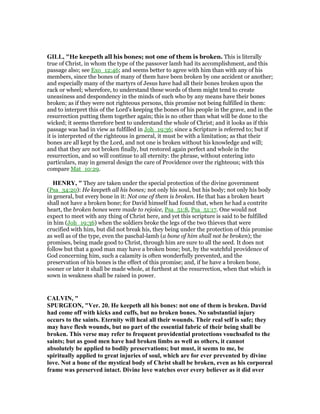
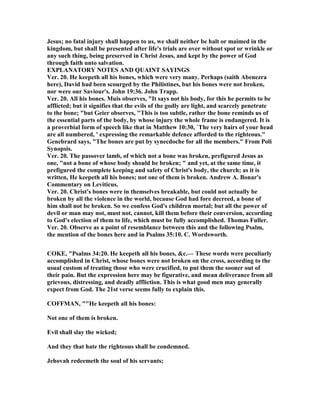
![And none of them that take refuge in him shall be condemned."
"All his bones ... not one ... is broken" (Psalms 34:20). In this verse, David doubtless
had in mind the passage in Exodus 12:46, in which Moses' instructions for the
eating of the Passover carried the injunction, " either shall ye break a bone
thereof." Evidently, David's knowledge of the typical nature of the Passover led him
to the inspired statement here that for the truly righteous, it would also be true that
"not a bone should be broken." At any rate, the deduction was true enough; and
Christ, the only truly righteous One, saw the complete fulfilment of this in his own
person on the Cross.
The apostle John's Gospel relates how Pilate's order to break the legs of Jesus was
frustrated, "That the Scriptures might be fulfilled" (John 19:36), "A bone of him
shall not be broken" (Exodus 12:46; Psalms 34:20). In all probability, John had
both these Scriptures in mind.
These last two verses were accurately summarized by Leupold, as follows:
"The outcome for the ungodly will always be this, `Evil shall slay the wicked, and
they that hate the righteous shall pay the penalty.' On the other hand, those that
seek to live in the fear of the Lord, are here designated as `His servants.' They have
this assurance, that, `The Lord redeems the life of his servants, and that all who
take refuge in him shall not pay the penalty.'"[18]
"Jehovah redeemeth" (Psalms 34:22). This word `redeem,' according to Dahood, "Is
a metaphor depicting Jehovah as paying ransom money (to Death) to assure his
saints of life."[19]; Job 5:20 also has a statement that seems to say the same thing.
"In famine, he will redeem thee from death."
There are many things, perhaps, which our finite minds shall never comprehend
about how Jesus ransoms us from death; but it is a fact, gloriously stated by our
Lord himself:
"For the Son of Man also came not to be ministered unto, but to minister, and to
give his life a ransom for many" (Mark 10:45).
21 Evil will slay the wicked;
the foes of the righteous will be condemned.](https://image.slidesharecdn.com/psalm34commentary-160516140540/85/Psalm-34-commentary-126-320.jpg)
![BAR ES, "Evil shall slay the wicked - That is, his own wicked conduct will be the
cause of his destruction. His ruin is not arbitrary, or the mere result of a divine
appointment; it is caused by sin, and is the regular and natural consequence of guilt. In
the destruction of the sinner, there will not be any one thing which cannot be explained
by the supposition that it is the regular effect of sin, or what sin is, in its own nature,
suited to produce. The one will measure the other; guilt will be the measure of all that
there is in the punishment.
And they that hate the righteous - Another term for the wicked, or a term
designating the character of the wicked in one aspect or view. It is true of all the wicked
that they must hate the righteous in their hearts, or that they are so opposed to the
character of the righteous that it is proper to designate this feeling as “hatred.”
Shall be desolate - Margin, “shall be guilty.” Prof. Alexander and Hengstenberg
render this, as in the margin, “shall be guilty.” DeWette, “shall repent.” Rosenmuller,
“shall be condemned.” The original word - אשׁם 'âsham - means properly to fail in duty, to
transgress, to be guilty. The primary idea, says Gesenius (Lexicon), is that of
“negligence,” especially in going, or in gait, as of a camel that is slow or faltering. Then
the word means to be held or treated as faulty or guilty; and then, to bear the
consequences of guilt, or to be punished. This seems to be the idea here. The word is
sometimes synonymous with another Hebrew word - ישׁם yâsham - meaning to be
desolate; to be destroyed; to be laid waste: Eze_6:6; Joe_1:18; Psa_5:10. But the usual
meaning of the word is undoubtedly retained here, as signifying that, in the dealings of
Providence, or in the administering of divine government, such men will be held to be
guilty, and will be treated accordingly; that is, that they will be punished.
CLARKE, "Evil shall slay the wicked - The very thing in which they delight shall
become their bane and their ruin.
They that hate the righteous - All persecutors of God’s people shall be followed by
the chilling blast of God’s displeasure in this world; and if they repent not, shall perish
everlastingly.
GILL, "Evil shall slay the wicked,.... Meaning either the evil they designed against
the righteous shall return and fall upon their heads, to their own ruin; or the evil of
affliction, which to them is the evil of punishment, both here and hereafter, from which
they will have no deliverance in the end; though the righteous have from their afflictions,
being not properly punishments, but chastisements for sin, and are but for a time; or
else the evil of sin, which is the cause of death corporeal and eternal;
and they that hate the righteous shall be desolate; or "shall be guilty" (n); be
found so; or "shall be condemned", or "damned", as the Targum renders it. All wicked
men hate the righteous, both Jesus Christ the righteous, and his people; and that
because they are righteous, and do not run into the same excess of wickedness with
them, these will be arraigned at the day of judgment, and will be convicted of all their
hard speeches which they have spoken against Christ and his members; and will be
pronounced guilty, and will be punished with everlasting destruction.
HE RY, " They are, and shall be, delivered out of their troubles. [1.] It is supposed](https://image.slidesharecdn.com/psalm34commentary-160516140540/85/Psalm-34-commentary-127-320.jpg)
![that they have their share of crosses in this world, perhaps a greater share than others.
In the world they must have tribulation, that they may be conformed both to the will of
God and to the example of Christ (Psa_34:19); Many are the afflictions of the righteous,
witness David and his afflictions, Psa_132:1. There are those that hate them (Psa_34:21)
and they are continually aiming to do them a mischief; their God loves them, and
therefore corrects them; so that, between the mercy of heaven and the malice of hell, the
afflictions of the righteous must needs be many. [2.] God has engaged for their
deliverance and salvation: He delivers them out of all their troubles (Psa_34:17, Psa_
34:19); he saves them (Psa_34:18), so that, though they may fall into trouble, it shall not
be their ruin. This promise of their deliverance is explained, Psa_34:22. Whatever
troubles befal them, First, They shall not hurt their better part. The Lord redeemeth the
soul of his servants from the power of the grave (Psa_49:15) and from the sting of every
affliction. He keeps them from sinning in their troubles, which is the only thing that
would do them a mischief, and keeps them from despair, and from being put out of the
possession of their own souls. Secondly, They shall not hinder their everlasting bliss.
None of those that trust in him shall be desolate; that is, they shall not be comfortless,
for they shall not be cut off from their communion with God. No man is desolate but he
whom God has forsaken, nor is any man undone till he is in hell. Those that are God's
faithful servants, that make it their care to please him and their business to honour him,
and in doing so trust him to protect and reward them, and, with good thoughts of him,
refer themselves to him, have reason to be easy whatever befals them, for they are safe
and shall be happy.
In singing these verses let us be confirmed in the choice we have made of the ways of
God; let us be quickened in his service, and greatly encouraged by the assurances he has
given of the particular care he takes of all those that faithfully adhere to him.
JAMISO , "Contrast in the destiny of righteous and wicked; the former shall be
delivered and never come into condemnation (Joh_5:24; Rom_8:1); the latter are left
under condemnation and desolate.
CALVI , "21.But malice shall slay the wicked. The Hebrew word ,רעהraäh, which I
have translated malice, some would rather render misery, so that the meaning
would be, that the ungodly shall perish miserably, because in the end they shall be
overwhelmed with calamities. The other translation, however, is more expressive,
namely, that their wickedness, with which they think themselves fortified, shall fall
upon their own heads. As David therefore taught before, that there was no defense
better than a just and blameless life, so now he declares, that all the wicked
enterprises of the wicked, even though no one should in any thing oppose them, shall
turn to their own destruction. In the second clause of the verse he states, that it is for
the sake of the righteous that it is ordered, that the ungodly are themselves the cause
and instruments of their own destruction. Those, says he, who hate the righteous
shall be destroyed Let this, therefore, be to us as a wall of brass and sure defense;
that however numerous the enemies which beset us may be, we should not be afraid,
because they are already devoted to destruction. The same thing David confirms in
the last verse, in which he says, that Jehovah redeems the soul of his servants How
could they be preserved in safety, even for a moment, among so many dangers,](https://image.slidesharecdn.com/psalm34commentary-160516140540/85/Psalm-34-commentary-128-320.jpg)
![unless God interposed his power for their defense? But by the word redeem there is
expressed a kind of preservation which is repugnant to the flesh. For it is necessary
that we should first be adjudged or doomed to death, before God should appear as
our redeemer. From this it follows, that those who hurry forward too precipitately,
and are unable to realize God’s power unless he appear speedily, working
deliverance for them, intercept the communication of his grace. Moreover, that none
might form their judgment of the servants of God by moral or philosophic virtue
only, as it is called, David specifies this as a principal mark by which they may be
known, that they trust in God, on whom also their salvation depends.
SPURGEO , "Ver. 21. Evil shall slay the wicked. Their adversaries shall be killing;
they are not medicine, but poison. Ungodly men only need rope enough and they
will hang themselves; their own iniquities shall be their punishment. Hell itself is but
evil fully developed, torturing those in whom it dwells. Oh! happy they who have
fled to Jesus to find refuge from their former sins, such, and such only will escape.
And they that hate the righteous shall be desolate. They hated the best of company,
and they shall have none; they shall be forsaken, despoiled, wretched, despairing.
God makes the viper poison itself. What desolation of heart do the damned feel, and
how richly have they deserved it!
EXPLA ATORY OTES A D QUAI T SAYI GS
Ver. 21. Evil. Afflictions though in the plural, prove not ruinous to the righteous, for
the Lord delivers him out of them all, whereas evil in the singular slays the wicked,
to signify the difference of God's economy towards righteous and wicked men. The
former is permitted to fall into many pressures, the latter is not so frequently
exercised with them, yet the many that befall the one do no hurt, but work good for
him, whereas the few that befall the wicked, or perhaps the one singular affliction of
his life is the utter ruin of him. Henry Hammond.
Ver. 21. --
Conscience self the culprit tortures, gnawing him with pangs unknown; For that
now amendment's season is for ever past and gone, And that late repentance findeth
pardon none for all her moan.
S. Peter Damiano, 988-1072.
Ver. 21. Shall be desolate. In the margin it is, shall be guilty. And this is the proper
meaning of the original word, (wmvay). They are guilty, and liable to punishment.
Thus the word is frequently rendered in our version (see Leviticus 4:13; Leviticus
4:22); and generally includes it in the idea of guilt, and the punishment incurred by
it. Samuel Chandler, D.D.
TRAPP, "Psalms 34:21 Evil shall slay the wicked: and they that hate the righteous
shall be desolate.
Ver. 21. Evil shall slay the wicked] For lack of such deliverance, as Psalms 34:19,
malum iugular authorem mali Their malice shall prove their mischief. The Arabic
hath it (but not right), mors impii pessima. Aben Ezra better senseth it thus, One
affliction killeth the wicked; when out of many God delivereth the righteous.](https://image.slidesharecdn.com/psalm34commentary-160516140540/85/Psalm-34-commentary-129-320.jpg)
